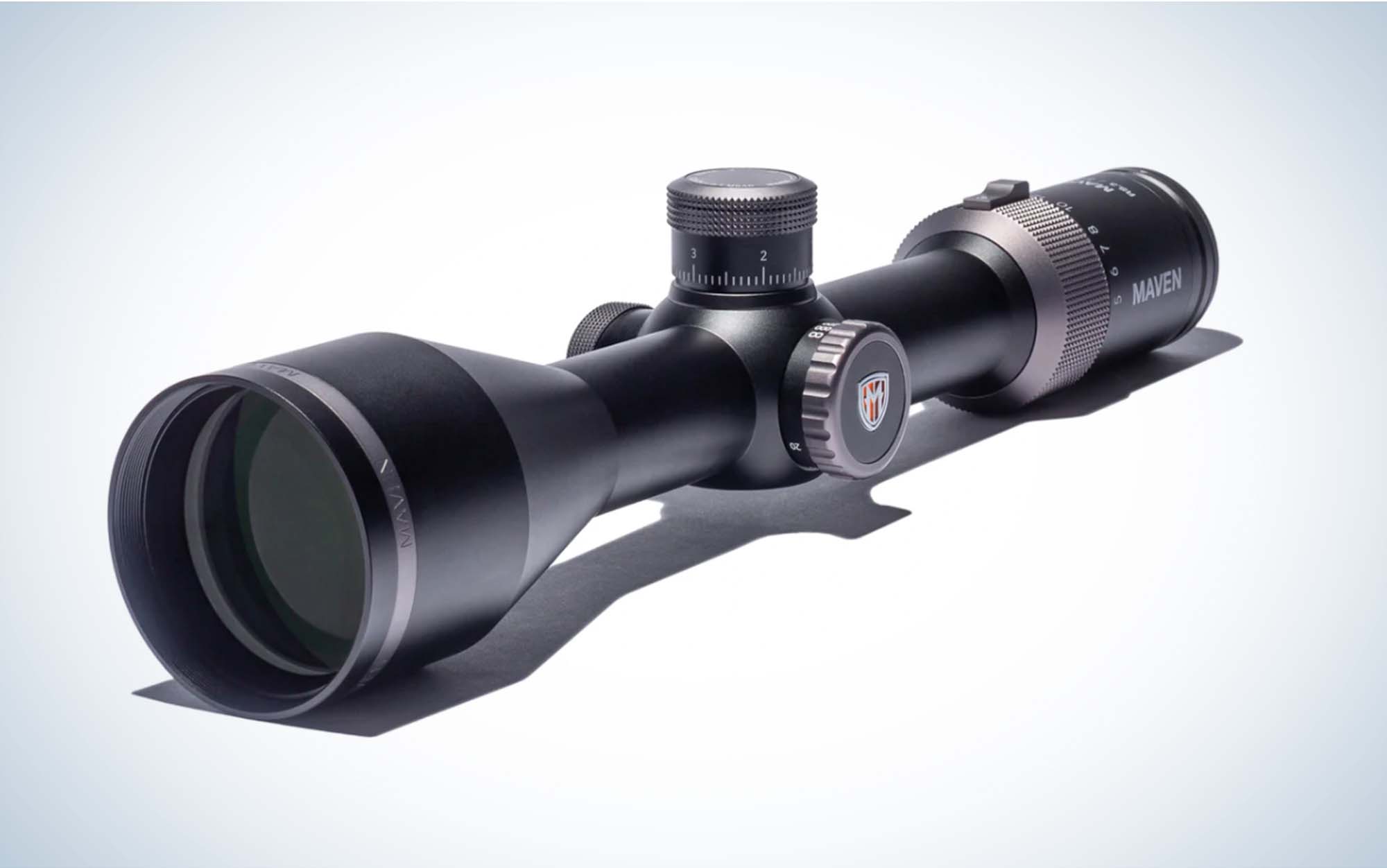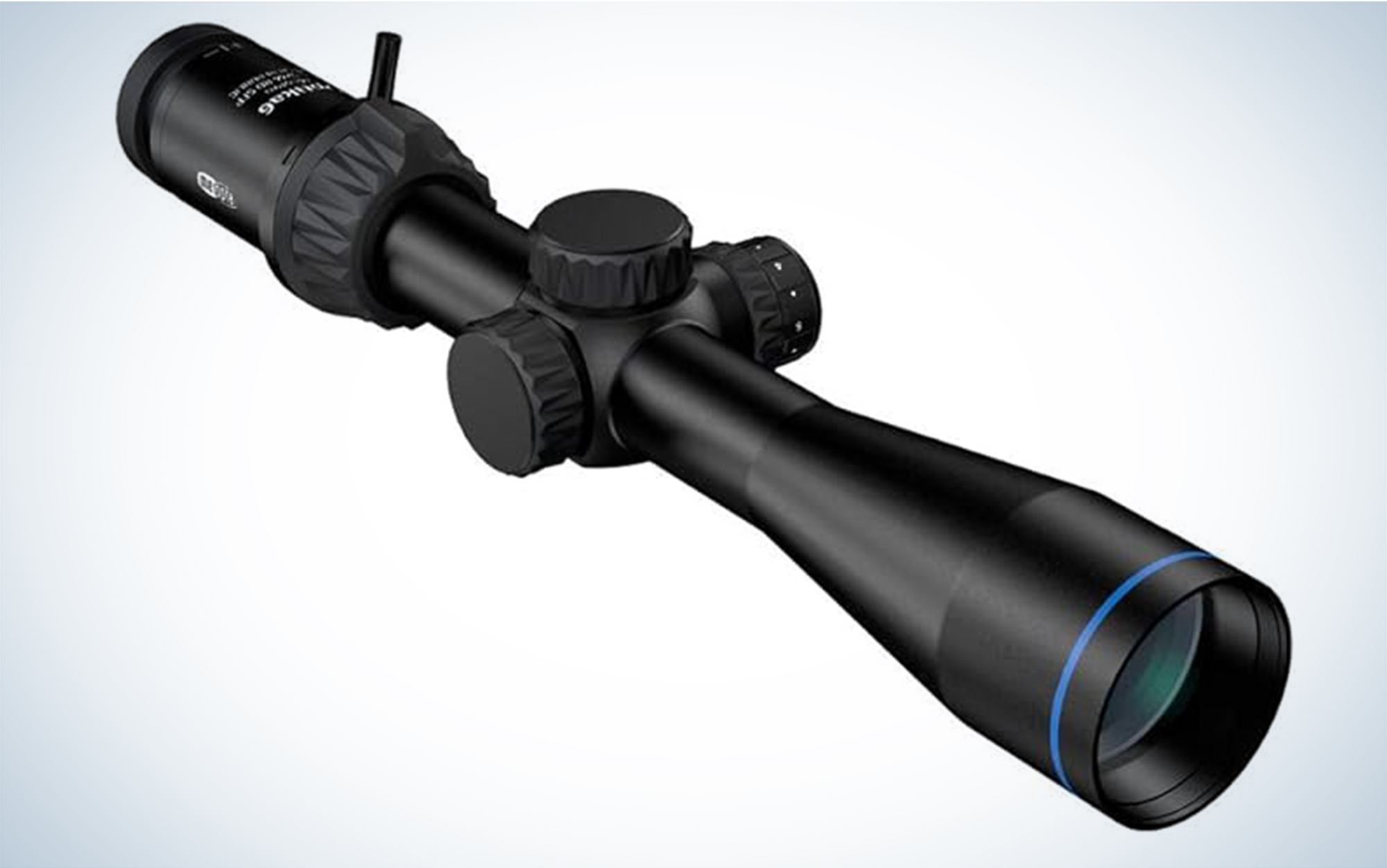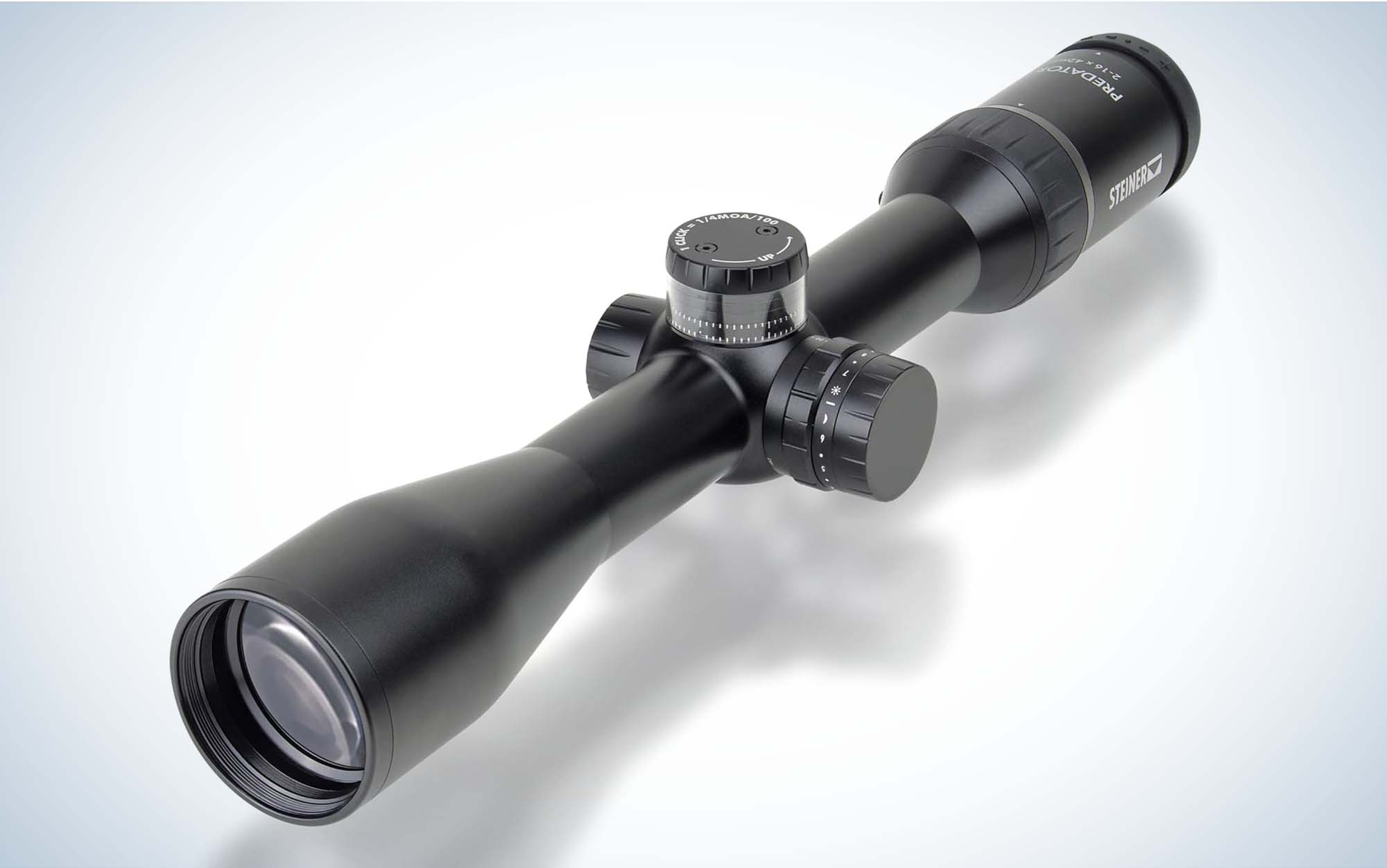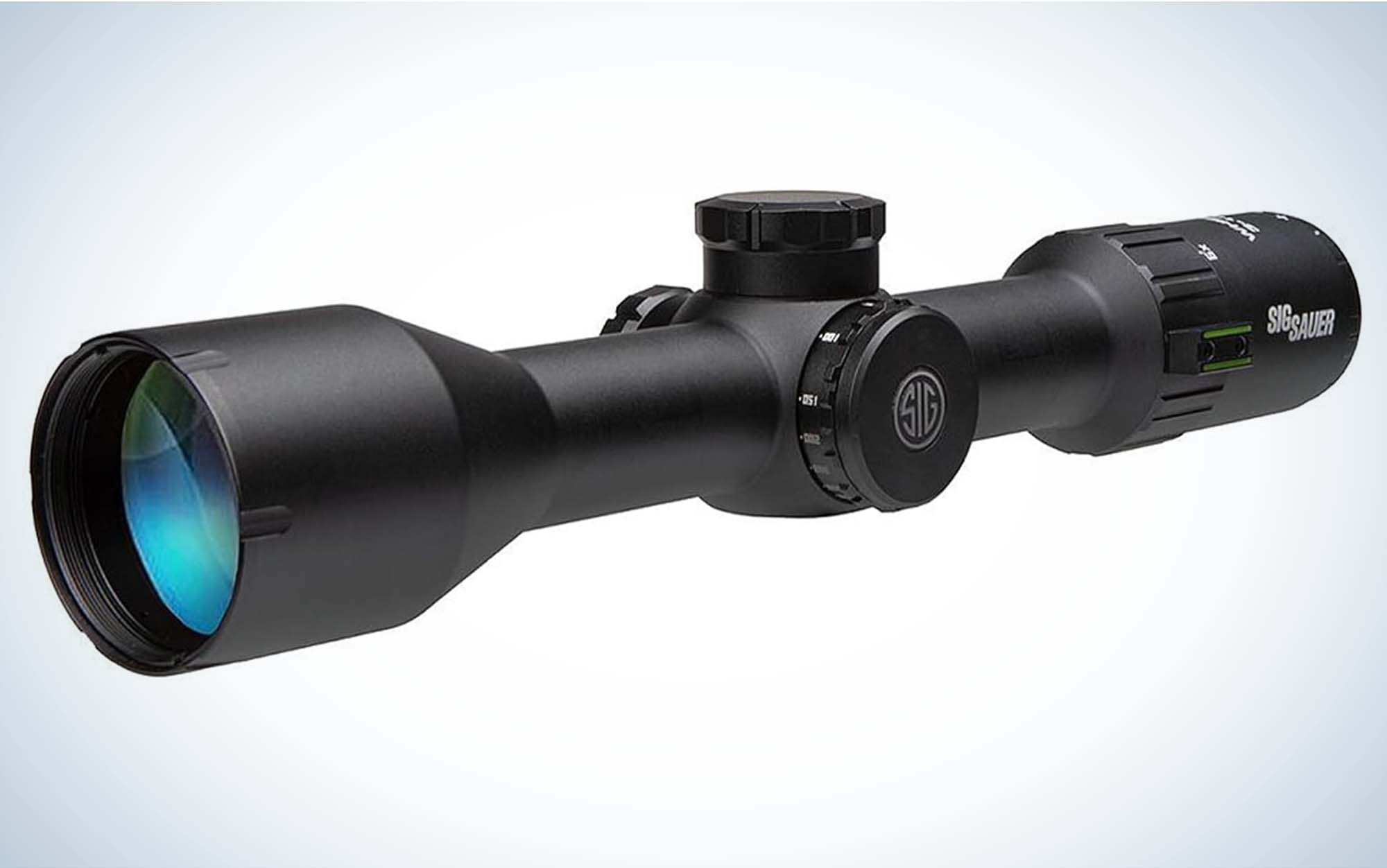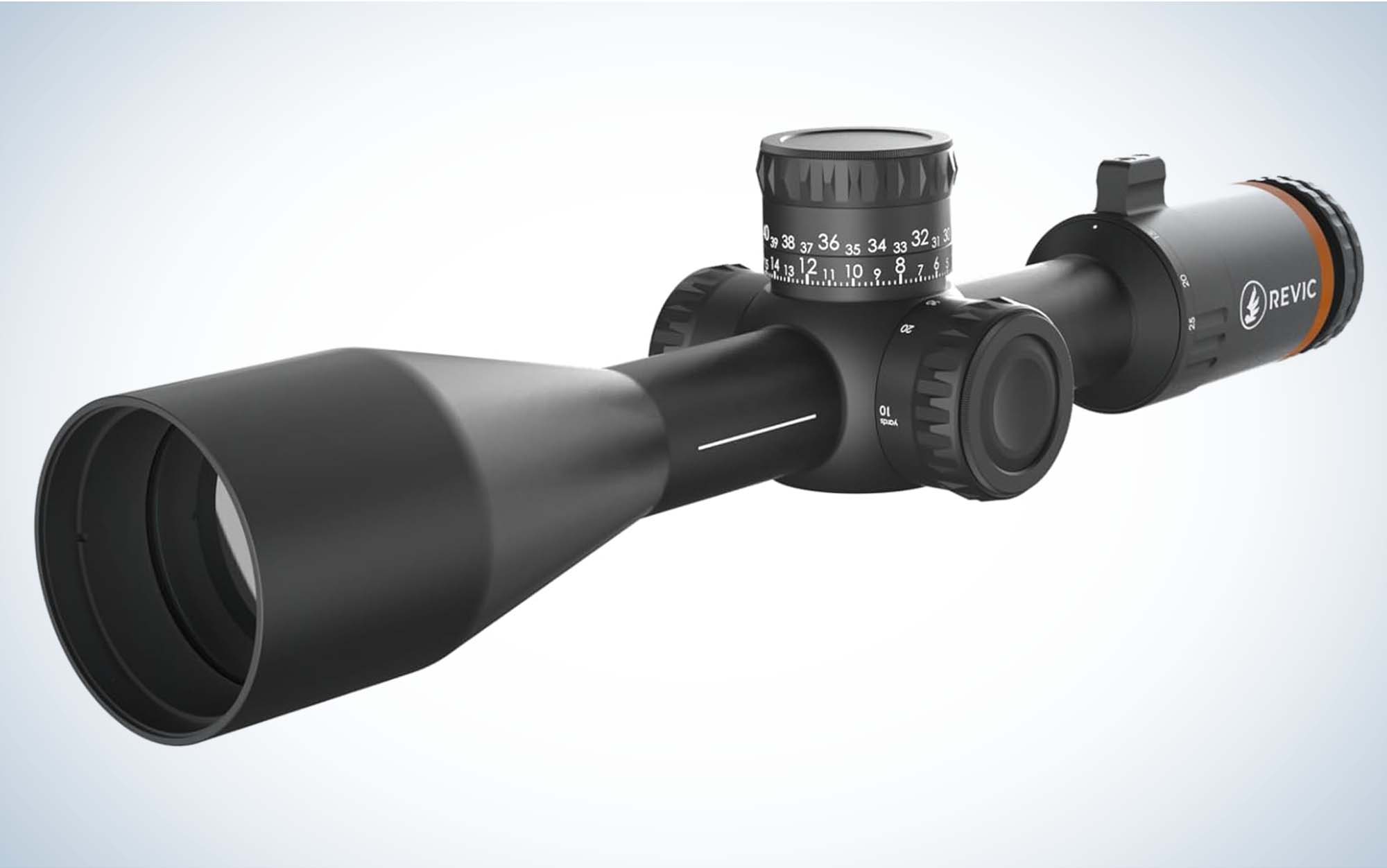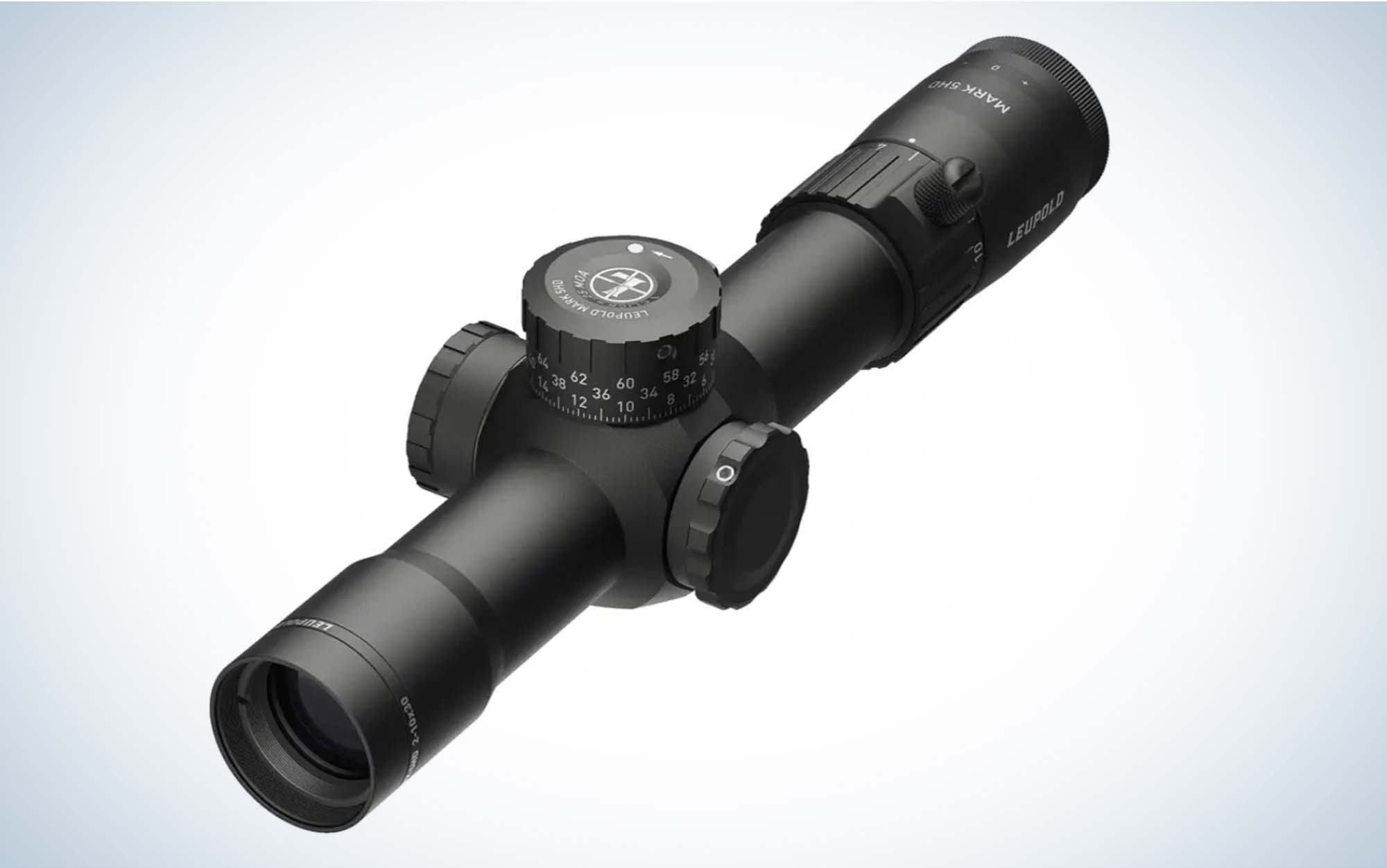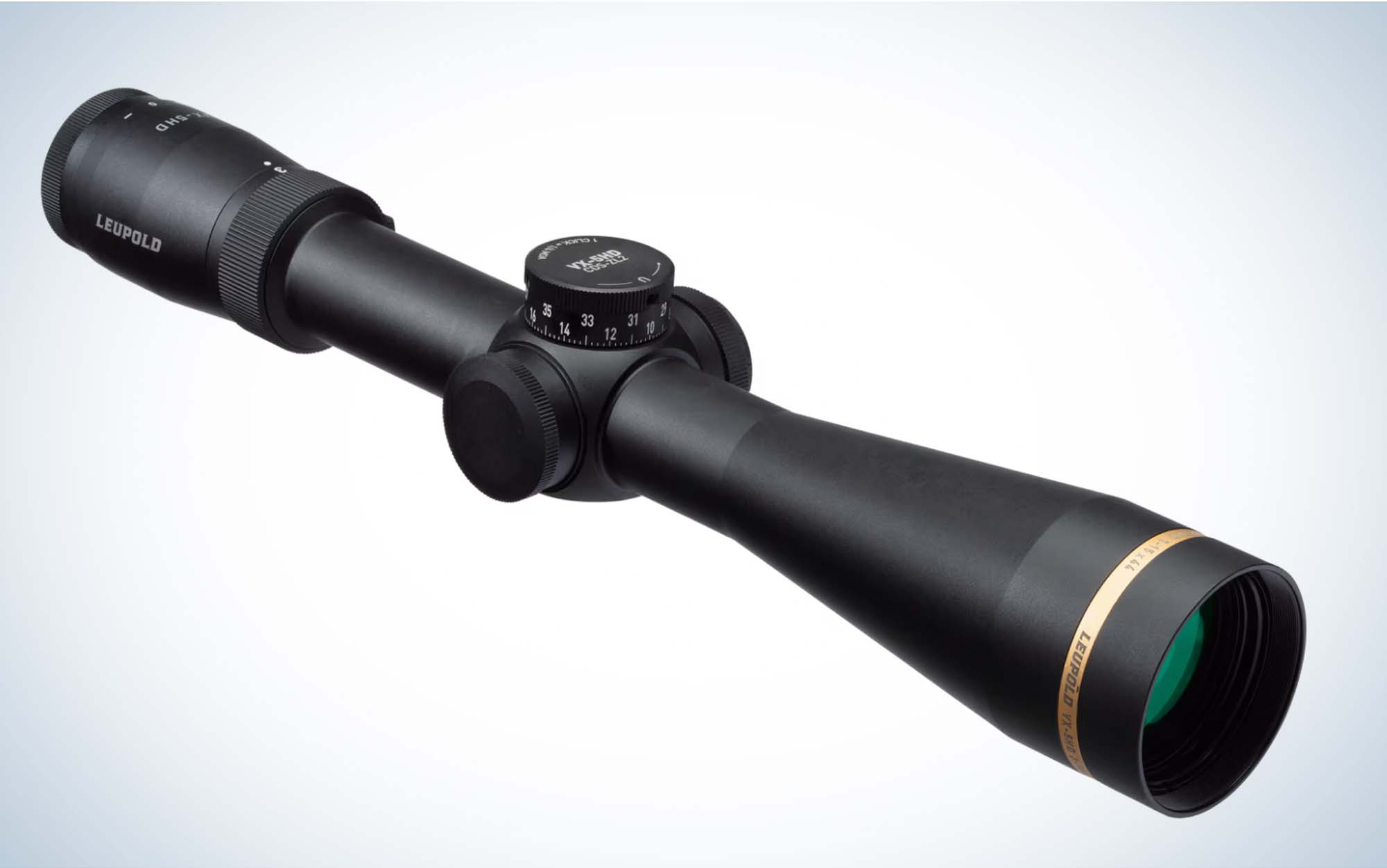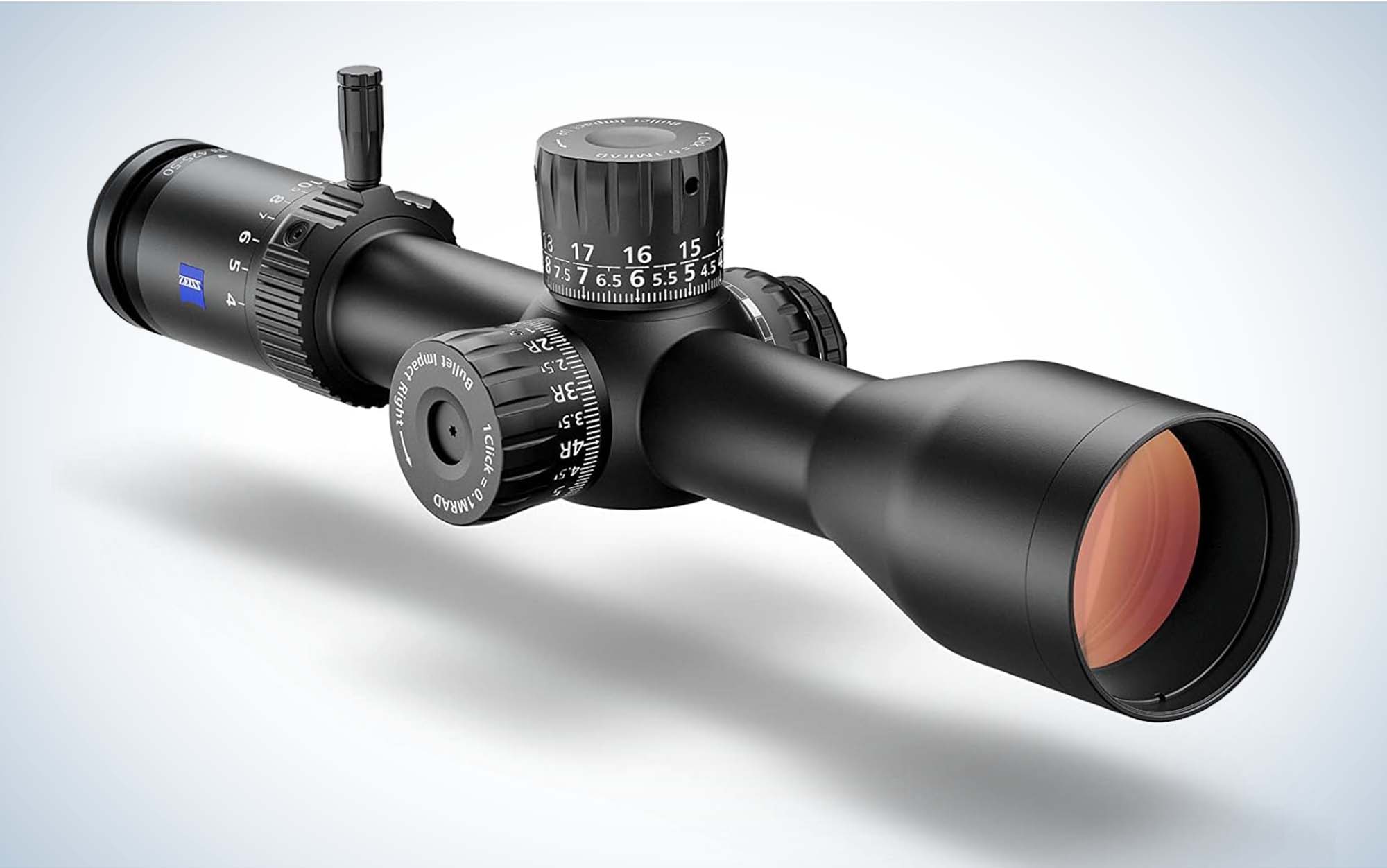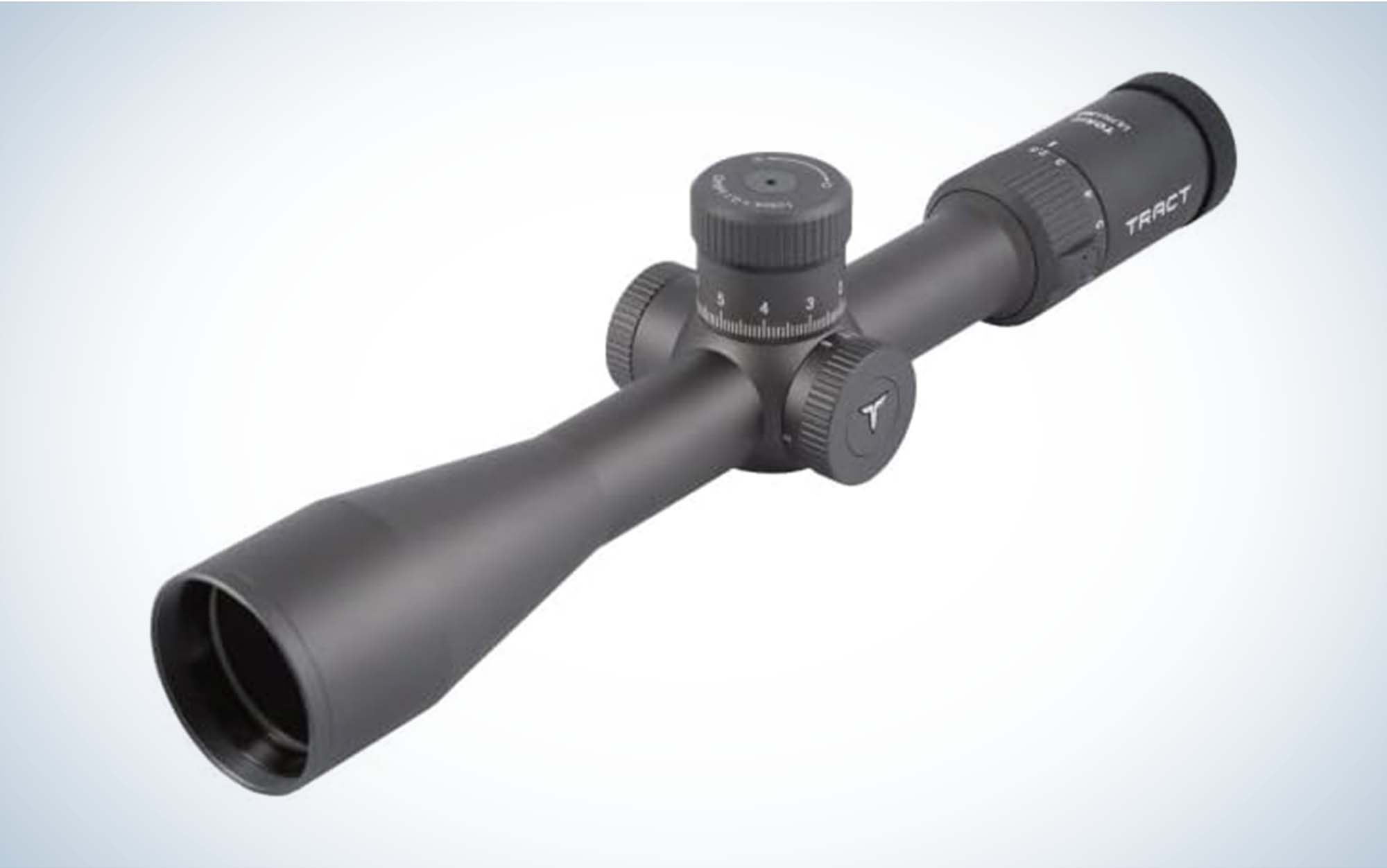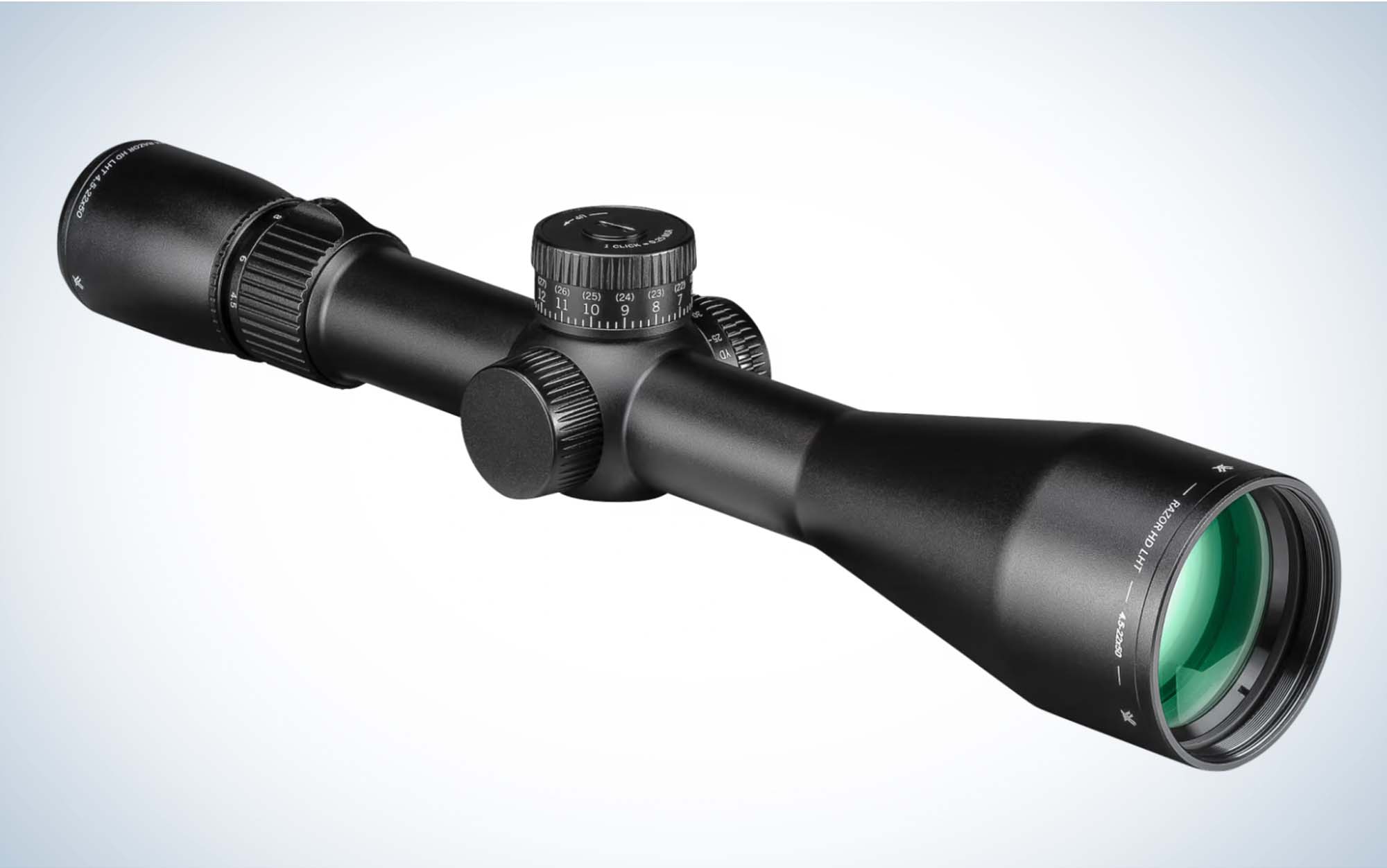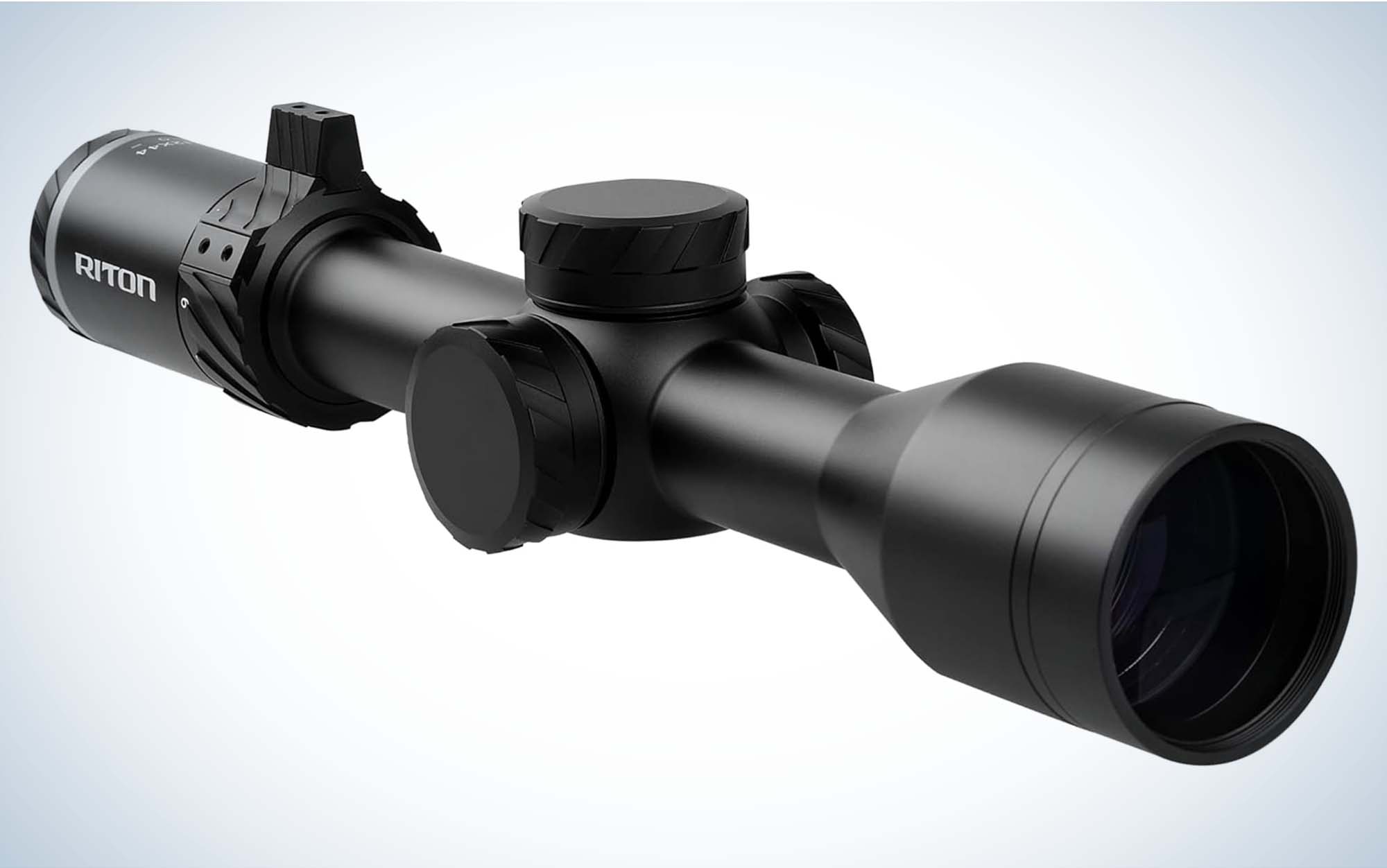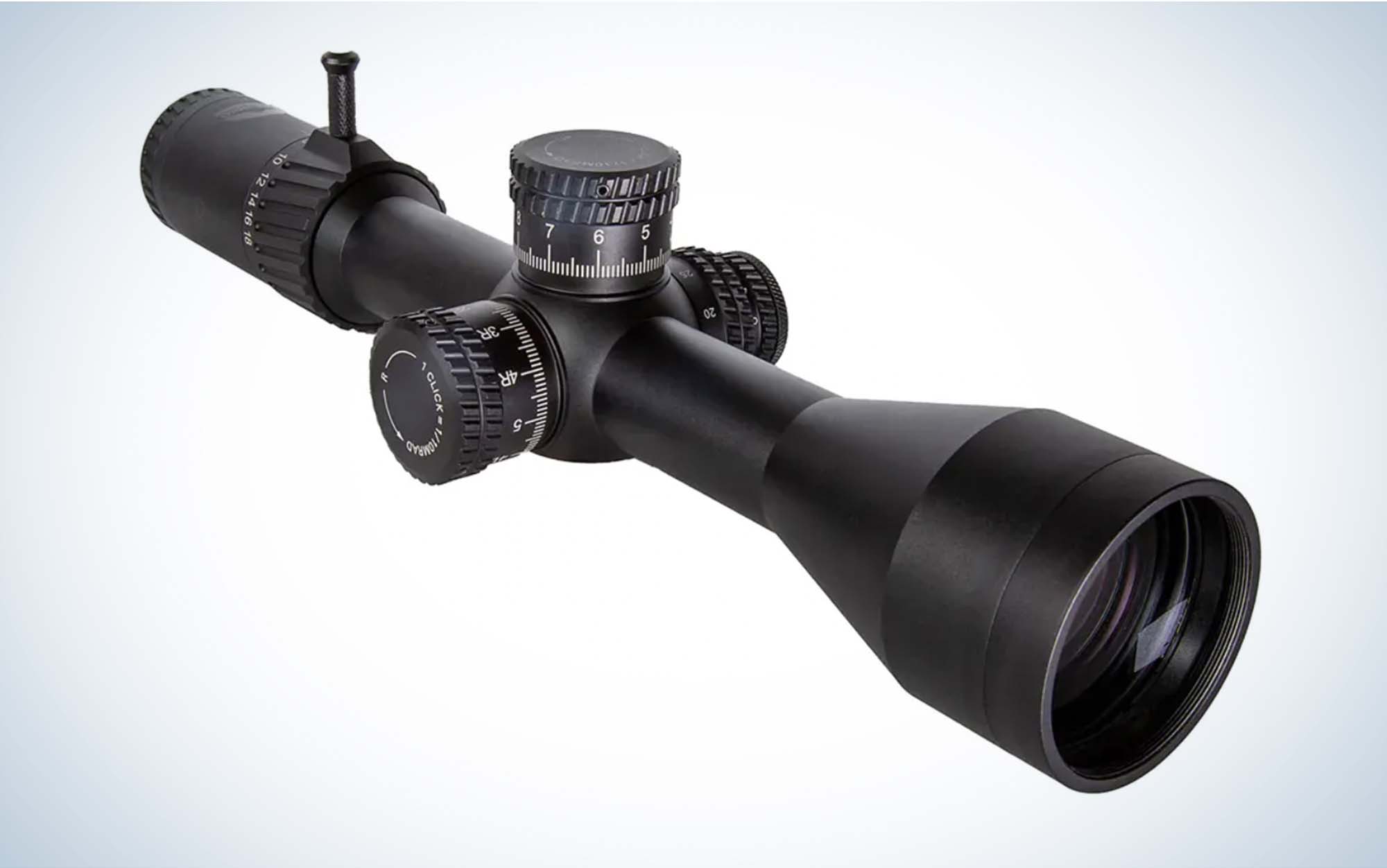[ad_1]
We might earn income from the merchandise out there on this web page and take part in affiliate packages. Be taught Extra ›
Over the previous decade, searching scopes have turn out to be more and more specialised, to the diploma that the concept of a single scope that a number of rifles would possibly share is as quaint and unlikely because the notion of a stranger returning your misplaced pockets.
Exhibit A is the rise of purpose-driven precision scopes to fulfill the particular necessities of long-range goal shooters. These are large scopes, normally constructed on 34mm tubes, with 56mm goal lenses and magnification within the 5-to-30-power vary. They usually have first-plane reticles, outsized uncovered turrets tuned to milliradian values, and weigh properly over 2 kilos.
Exhibit B is the evolution of extraordinarily light-weight searching rifles, racing towards the 5-pound mark and promising sub-minute-of-angle accuracy. No mountain hunter value their gaiters will mount a giant scope on such a slender rifle. As an alternative, they’re on the lookout for a light-weight scope with sufficient precision attributes to position bullets over lengthy ranges, typically at excessive angles, with out overthinking a sophisticated reticle.
If it appears inconceivable to bridge the hole between these two capturing calls for, then you definitely haven’t been being attentive to {the marketplace}. We now have a bevy of versatile searching scopes that may be mounted on a precision chassis rifle, a light-weight searching rifle, a contest rimfire rifle, and even your favourite whitetail gun. Given that quantity of versatility, these scopes are usually not solely our new utility gamers, however in addition they characterize a major worth proposition due to their capability to cross between platforms.
Out of doors Life’s optics take a look at group gathered a full dozen new searching scopes, and examined them alongside one other 11 which have been available on the market for a pair years, all in an effort to find out that are value your consideration and your cash. Right here’s an abbreviated listing of one of the best searching scopes that may do all of it.
How We Examined the Greatest Searching Scopes
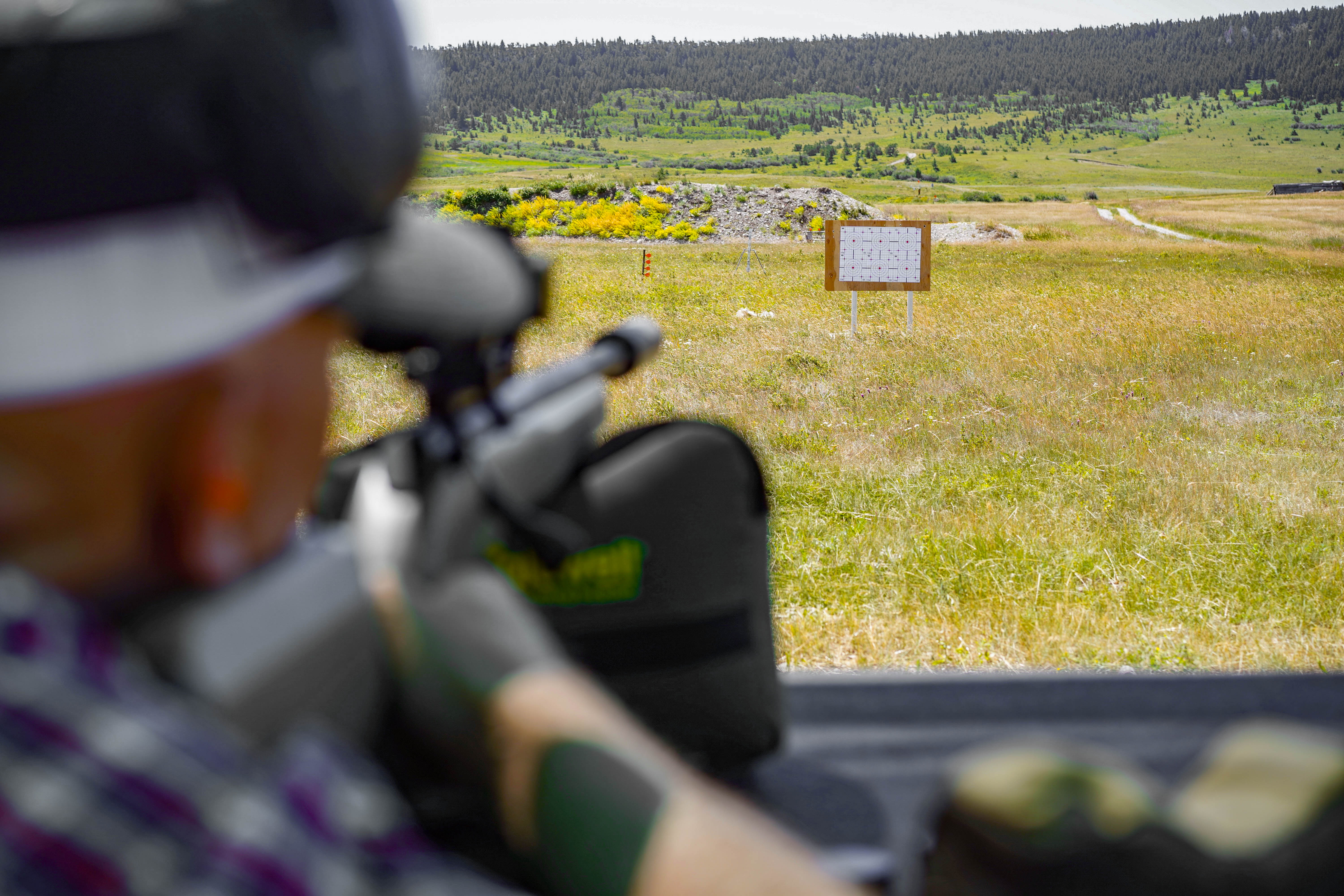
As a result of rifle scopes are primarily aiming gadgets, we consider them on a special foundation than binoculars or recognizing scopes, optical devices which have broader utility. We’re within the precision of a rifle scope, so our scoring standards offers extra weight to attributes that obtain that purpose.
We invited new merchandise for 2023, however we included a number of scopes which have been available on the market for a yr or two to higher consider this promising class’s evolution.
Testing Reticles and Monitoring
We take a look at optical efficiency, similar as we do spotters and binoculars. However we spend extra time on 4 standards that we expect are the beating coronary heart of a strong rifle scope. Our “inside aiming system” concerns are reticle model and utility, illumination, reticle references, and visibility. Our “exterior aiming system” analysis considers turret positivity and indexing, the scope’s zero cease, parallax management, and adjustment vary. We additionally take a look at a spread of attributes that we bundle underneath the heading “precision,” which embrace turret monitoring, return to zero, the trueness of the scope’s magnification, parallax, and discipline of view. After which we ask testers to charge a scope’s “shootability,” which considers eye aid, the benefit of use at numerous magnifications, and the scope’s versatility.
Optical Efficiency
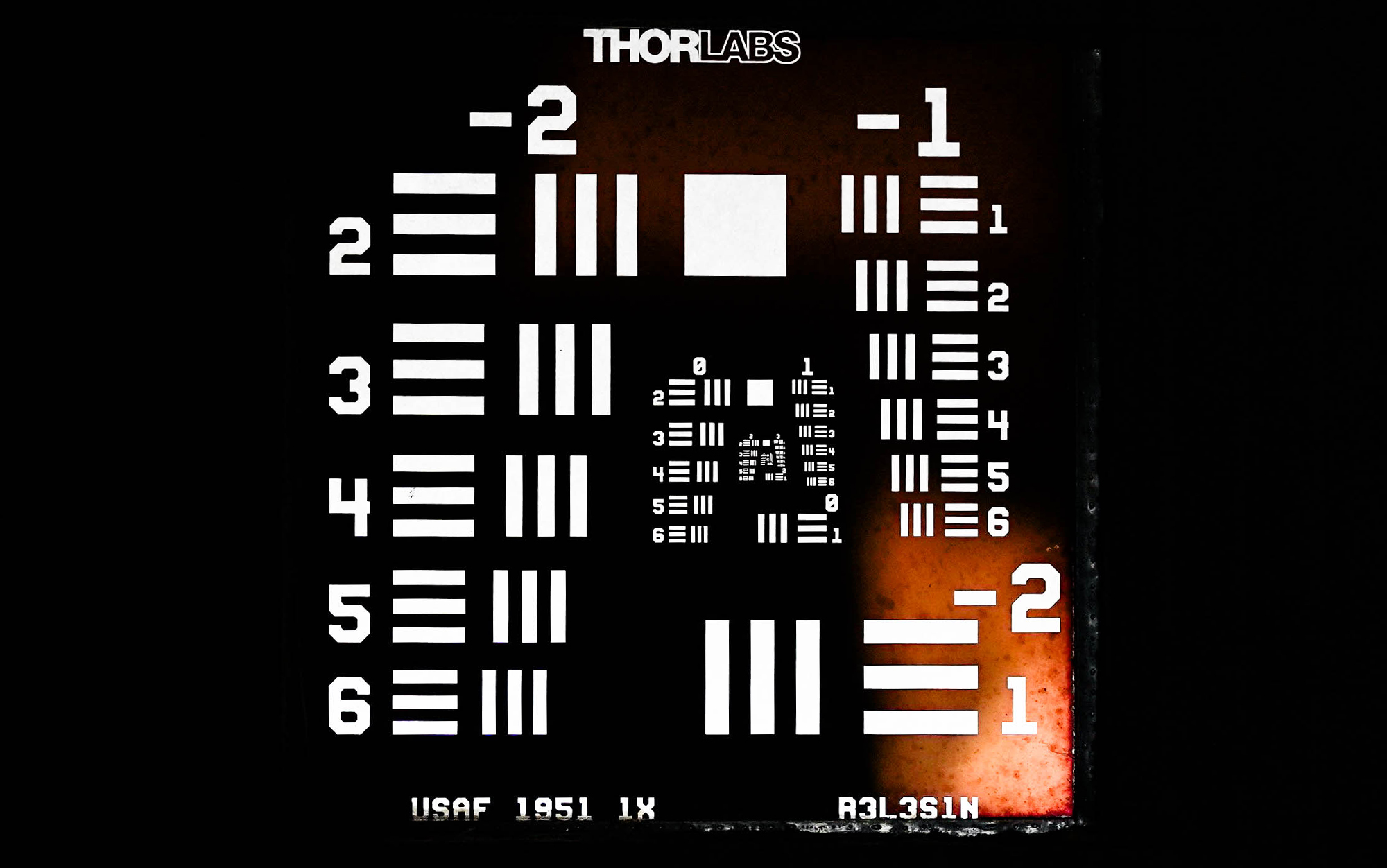
We put all submissions by means of the identical standards. First, we measure optical decision, utilizing the diminishing black-and-white traces of a 1951 Air Power Decision Goal to attain the optical efficiency of every submission. We additionally measure the low-light efficiency of every “versatile” scope by mounting them to tripods and focusing them as a bunch at 200 yards at a black-and-white decision goal at twilight, all with the intention to measure the brightness of the glass. As we mentioned, neither decision nor low-light efficiency are deal-breakers on this class, however each standards present beneficial insights into the optical efficiency of the scope.
Versatility
That final consideration — versatility — might be probably the most significant on this class. We’re thinking about scopes that may span a variety of makes use of, from ringing metal at a mile to killing a twitchy mule deer at 1 / 4 that distance. Goal-shooting attributes are a plus, however so are portability, a clear however helpful reticle, and exact, sturdy controls like turrets, illumination, and clear glass. We additionally rewarded scopes that might do triple obligation as close-in rimfire goal optics, mountain searching optics, and long-range competitors scopes.
Scoring
We break our 10-point scoring into 4 basic classes:
- Optical efficiency (25 p.c of complete grade)
- Aiming system (50 p.c of complete grade)
- Design (15 p.c)
- Worth (10 p.c)
The typical of those classes is the premise of our grades, detailed beneath.
Optical efficiency contains the decision and low-light assessments plus the extra subjective assessments of picture high quality and brightness. Aiming-system efficiency assesses inside and exterior aiming system, precision, and that squishy shootability evaluation. Design considers the outside end, inside blacking, mounting dimensions, and sturdiness.
After which our value/worth rating charges how a lot scope — together with guarantee and facilities comparable to rings, additional turrets, and lens covers — you get in your cash. The rifle scope that will get the very best general rating wins our Editor’s Selection award for one of the best within the class; the optic with the very best value/worth rating wins our Nice Purchase recognition, and we give different awards primarily based on particular attributes.
How We Graded Rifle Scopes
Our 100-point analysis provides as much as a complete numeric rating, however we translate these to grades for every submission. Our Optical Efficiency grade combines the scores from decision, low-light, and picture high quality. Our Aiming System Efficiency grade aggregates the inside/exterior aiming system, precision, and shootability scores. The Design grade considers Building, Innovation, Versatility, and Sturdiness. After which the Worth/Worth grade is our worth grade.
To earn an “Glorious” grade, the common of that class have to be 9 or increased, which is extraordinarily onerous to attain. “Very Good” is a mean rating of seven to 9. A “Good” grade is 5 to 7. Our “Honest” grade is 3 to five, and “Poor” is something underneath 3.
The Greatest Searching Scopes: Opinions and Suggestions
Greatest Total: Maven RS3.2 5-30×50 FFP
Rating Card
- Optical Efficiency: Very Good
- Aiming System: Glorious
- Design: Very Good
- Worth/Worth: Very Good
Key Options
- 5-30-power magnification
- 30mm tube
- 27.8 ounces
- First-plane reticle
- 80 MOA/23 MIL complete elevation vary
- 20-yards-to-infinity parallax
Execs
- Extraordinarily brilliant and clear glass
- Velvety controls
- Out there in both MOA or MIL changes
- Three reticle choices
- Customized turrets out there
- Lifetime guarantee
Cons
- Restricted reticle choices
- Prime-end magnification somewhat an excessive amount of
- No reticle illumination
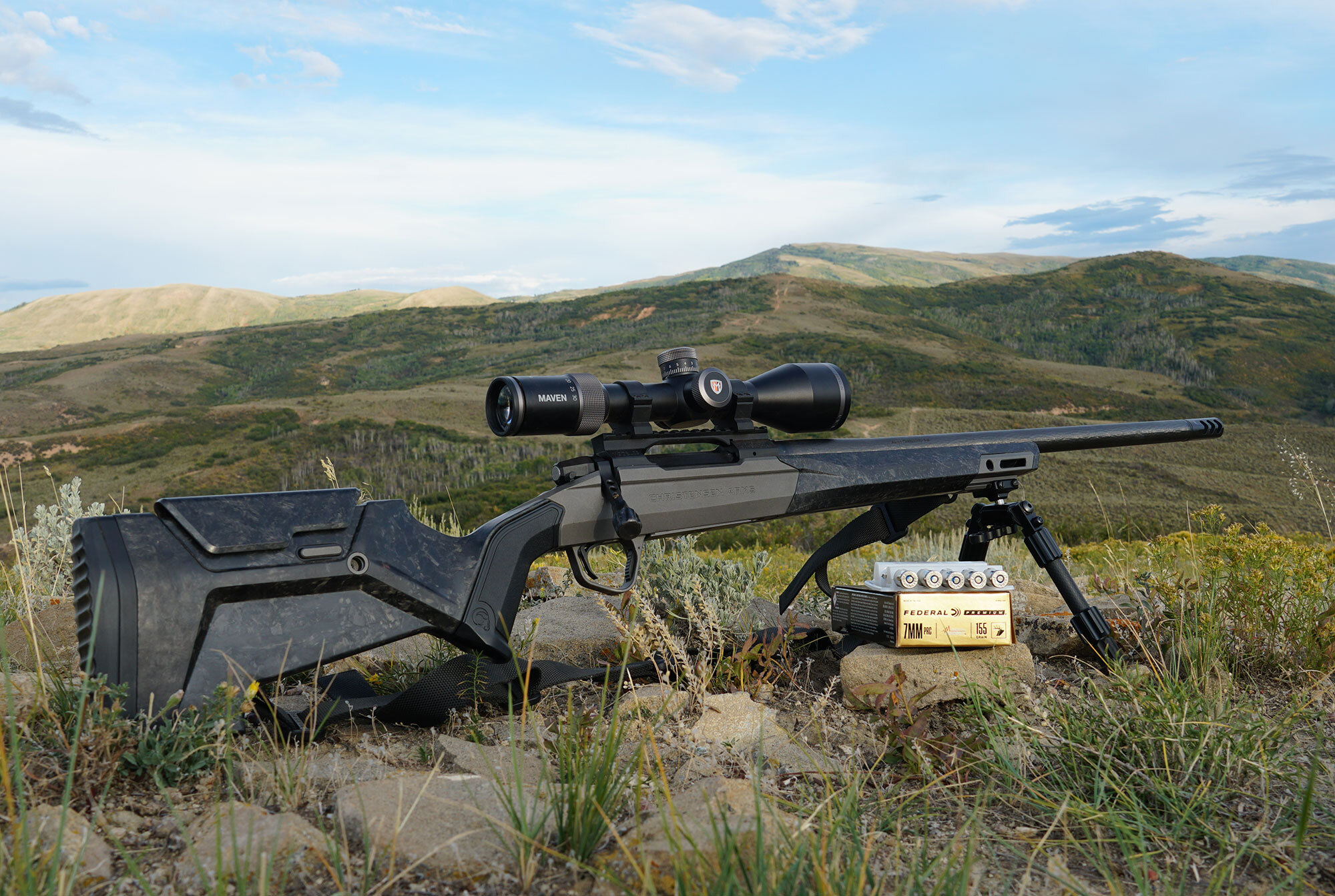
There are only a few misses on this crossover scope that leans barely towards Western big-game hunters however which may ship sufficient precision long-range goal scores. This redesigned scope from Maven affords all of the goodies you’d count on: a first-plane reticle, a modest goal lens that enables for low-profile mounting choices, tactile and responsive turrets that enable customers to both dial or use reticle references to carry a capturing resolution, and a sturdy bundle that’s as at dwelling on a precision chassis rifle as on a light-weight mountain rifle.
The RS3.2 isn’t very totally different from the OG of the class, Maven’s SR3. Updates embrace a capped windage turret, a extra tactile elevation turret, and a way-better tool-less zero cease, and the selection of a MIL-based reticle that builds on the unique MOA-based reticle. The value, proper at $1,600, stays a candy spot for a scope that may carry out so many duties with its mixture of efficiency and magnificence.
Let’s speak first about what this scope delivers. It begins with glorious Japanese glass that’s comparatively distortion-free and which doesn’t distract from its precision-shooting abilities. The scope’s controls, starting from its crisp turret actions to its 20-yards-and-out parallax, are positive and tight with out being onerous to maneuver.
As a bundle, it’s an excellent scope for a precision shooter who’s comfy making game-time changes to turrets and reticle references throughout a hunt. It isn’t as succesful as a purpose-built precision scope for PRS and NRL sort competitions. Although the tree-style CFR-MIL reticle will attraction to shooters who’ve shot in these forms of sensible precision competitions.
It’s a sturdy scope, with 80 MOA/23 MIL inner adjustment (50 MOA/14.8 MIL windage), and the 20-yards-to-infinity parallax makes it an excellent choice for rimfire competitors. At 27.8 ounces, it’s no mountain-rifle optic, however ought to carry out properly from the pronghorn prairies to the long-range metal stations.
Greatest Worth: Meopta Optika6 2.5-15×44
Rating Card
- Optical Efficiency: Very Good
- Aiming System: Glorious
- Design: Good
- Worth/Worth: Glorious
Key Options
- 2.5-15-power magnification
- 30mm tube
- Second-plane BDC reticle
- 20-yard-to-infinity parallax
- Capped turrets tuned to .25 MOA click on values
Execs
- Vibrant and clear glass
- Helpful holdover reticle with windage marks
- At underneath $700, an excellent worth
- Configured primarily for hunters
Cons
- No illumination
- Restricted utility for precision capturing
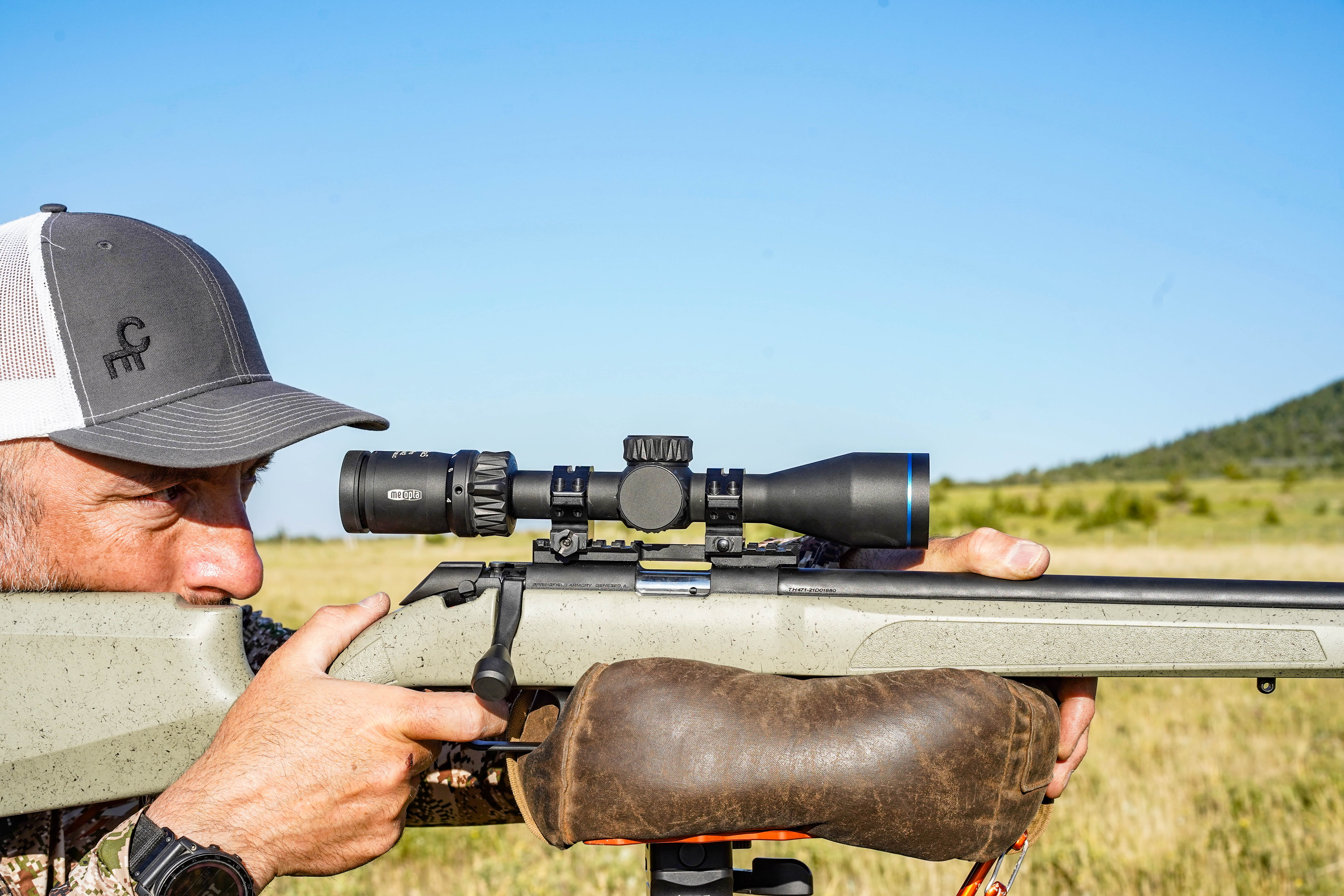
Our take a look at group was stunned, when all of the scores had been tabulated, to search out that this modest second-plane scope had positioned so excessive towards submissions with wider model recognition and extra purposeful attributes.
The Meopta6 has been round for a number of years, and on the face of it, doesn’t deliver any single ability set to this crossover recreation. As an alternative, it does quite a lot of issues — optical efficiency, mechanical precision, versatility, and value — properly sufficient to raise it into the highest third of our hunt/shoot scope discipline.
If that’s an underwhelming testimonial, it’s form of in keeping with Meopta’s character. This Czech firm has made a reputation for itself by offering European optical high quality with accessible costs and strong efficiency. The Optika6 continues that custom by bringing a strong second-plane BDC (bullet-drop compensating) reticle and strong turret dynamics to a scope that’s configured for Western big-game hunters however which is at dwelling within the whitetail woods and might flip in respectable precision-shooting scores. With its 10-yards-to-ininity parallax, it’s not a nasty candidate for precision rimfire work.
The BDC reticle, importantly, has very helpful windage marks. Consider it as Leupold’s Wind-Plex reticle, besides that it has 5 holdover marks on the vertical stadia that mix to assist with fast photographs and simply sufficient holdover and holdoff data to take photographs at recreation at 400 to 500 yards. The capped turrets aren’t actually designed for dialing, however the clicks are crisp and constant, and the 75 MOA of inner elevation and windage adjustment offers dialers loads of room to not solely zero this scope however march out aiming options.
Testers famous, nonetheless, that the Meopta’s abilities as a precision goal scope are critically missing. With that in thoughts, take into account this a fantastic worth in an all-around searching optic, which can disappoint shooters on the lookout for trophies in precision-target video games.
Learn Subsequent: Greatest Rifle Scopes Underneath $500
Greatest for Elk Searching: Steiner Predator 8 2-16×42
Rating Card
- Optical Efficiency: Very Good
- Aiming System: Glorious
- Design: Very Good
- Worth/Worth: Good
Key Options
- 2-16-power magnification
- 30mm tube
- Second-plane E3 MOA-based reticle
- Uncovered elevation turret with customizable ballistic rings
- Capped windage turret
- Turrets tuned to .25 MOA click on values
- Illuminated reticle with 11 depth steps
Execs
- Among the many greatest glass and coatings within the class
- Turret rings could be set to customized distances
- At 23 ounces and 13.5 inches, suits most rifles
- Easy and quick second-plane reticle with windage references
Cons
- Probably not configured for precision goal work
- 55 MOA adjustment vary is lower than friends
- At $1,800 real-world value, a reasonably costly scope
As its title implies, this world-beating optic from Steiner is configured extra for searching than for the cold sport of competitors capturing. The wonderful E3 ballistic reticle within the second aircraft is constructed for quick, intuitive aiming in dynamic searching conditions, and the customizable ballistic turret is equally made for quick, close-enough capturing.
Goal shooters will likely be dissatisfied with the dearth of reticle references, and should complain that the uncovered elevation turret lacks each exact indexing and the form of hyper-tactile suggestions that shooters have come to count on from severe precision scopes.
On condition that lean towards the sphere spots, it’s helpful to contemplate every thing the Steiner brings to a severe Western big-game hunter. First, the turret will likely be acquainted to hunters who’ve encountered Swarovski’s Ballistic Turret Flex, which options stacked elevation rings that may be pre-set to particular distances. Just like the Swaro, the Steiner’s turret can then be turned to these distance marks, and shooters can then make micro changes with both the reticle or the turret to place bullets heading in the right direction. It’s not probably the most exact system, but it surely’s quick and intuitive.
The Predator 8 has a exact parallax focus that sharpens targets from 20 yards out to infinity, and an 11-step illuminated fiber dot lights up the middle aiming cross within the second-plane reticle. We’ve had ample expertise with the E3 ballistic reticle, which has appeared in Burris scopes for years. It options three very obvious and helpful bullet drop references with wind holds for typical 90-degree wind values. The middle aiming cross is sharp and obvious, even with out the supplemental illumination.
The Steiner completed close to the highest of the sphere in low-light and determination testing, and testers notably appreciated the flexibility of the reticle-and-turret mixture. It misplaced factors for its underwhelming precision attributes, however for a hunter on the lookout for a quick, clear scope that’s suited to a customized sheep rifle, the Steiner could be very onerous to beat.
Greatest for Whitetail Searching: Sig Sauer WHISKEY6 3-18×44
Rating Card
- Optical Efficiency: Good
- Aiming System: Glorious
- Design: Very Good
- Worth/Worth: Good
Key Options
- 3-18-power magnification
- 30mm tube
- Second-plane MOA Milling Hunter 2.0 hash-style reticle
- 45-yards-to-infinity parallax
- 78 MOA elevation/windage adjustment vary
- Capped rezeroable turrets tuned to .25 MOA click on values
- Detachable throw lever
Execs
- Excessive-transmission glass in goal lens
- Exact facet focus
- Out there in both Milling Hunter or duplex reticles
Cons
- No reticle illumination
- Restricted precision goal functionality
- Higher-case WHISKEY6 is needlessly hyperbolic
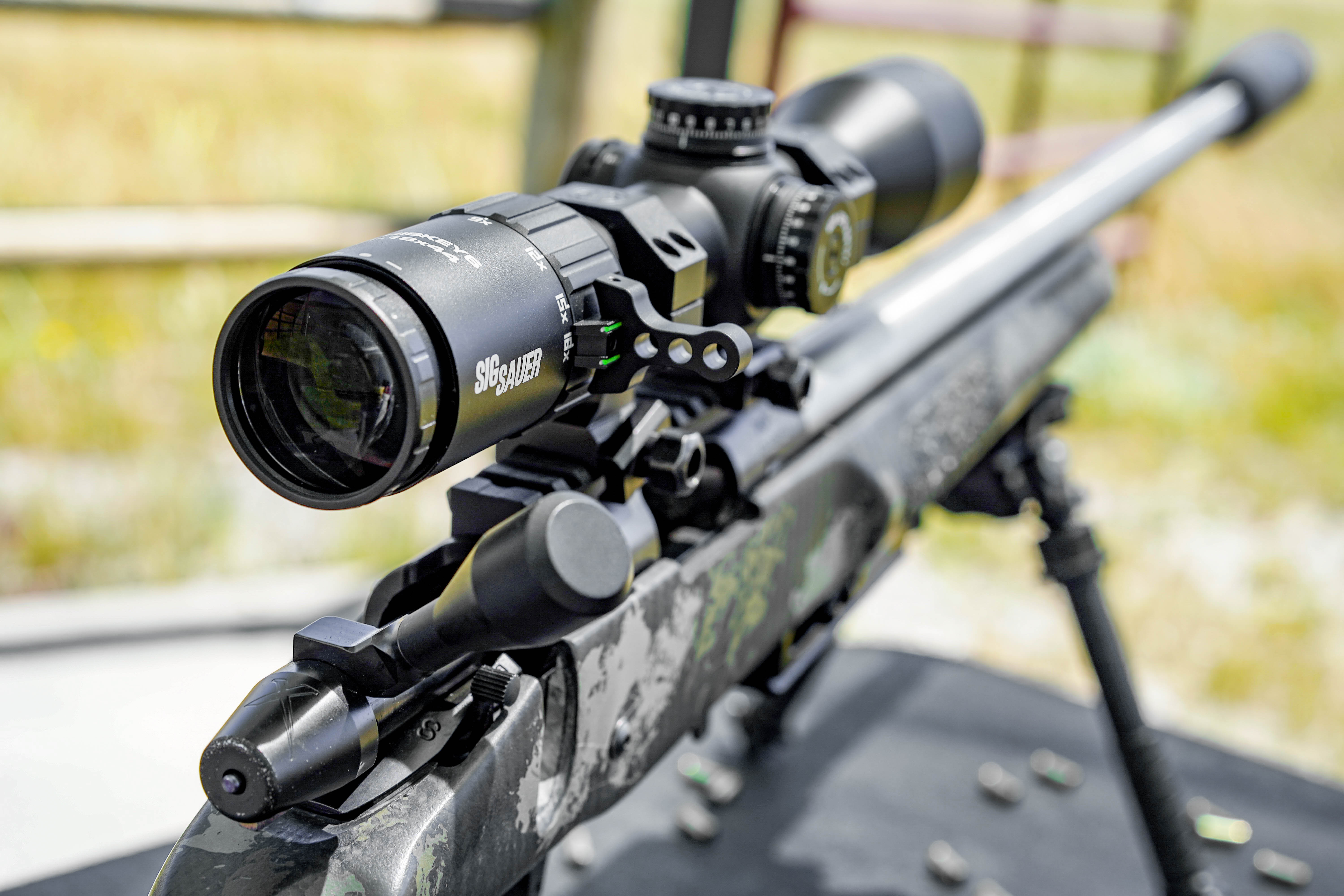
One other of the second-plane scopes on this class that can most likely disappoint severe precision-target shooters however which lean towards hunters with sufficient reticle references to make a displaying at long-range metal competitions is the WHISKEY6.
Sig brings a few noteworthy options to this in any other case center-of-mass searching scope. The primary is the MOA-based Milling Hunter 2.0 second-plane reticle. The hash-style reticle has sufficient references for each holdover elevation changes and holdoff windage changes to let a shooter stroll of their photographs. It is perhaps restricted for first-round hits, however with 30 MOA of holdover references and 20 MOA holdoff marks on both facet of the center-cross aiming level, it may be included within the “close-enough” reticle designs of our take a look at.
That description might be adequate for many whitetail hunters, who’re taking photographs inside 250 yards, but it surely’s going to carry this scope again for precision-target work. That’s okay, as a result of the WHISKEY6 can greatest be thought of as a rung on a shooter’s ladder, transferring from a straight duplex reticle as much as this reticle with loads of references, on their strategy to a first-plane reticle with a number of bullet-placement precision.
Most Progressive: Revic Acura RS25i 5-25×50
Rating Card
- Optical Efficiency: Good
- Aiming System: Glorious
- Design: Very Good
- Worth/Worth: Good
Key Options
- 5-25-power magnification
- 30mm tube
- First-plane RH2 MOA-based reticle
- Uncovered elevation turret with Ballistic Knowledge Ring
- Turrets tuned to .25 MOA click on values
- “Wind-Help Icons” information wind holds
- 10-step push-button crimson illumination
- 14-inch size designed for mid-sized rifles
Execs
- Glorious glass and coatings
- Out there with customizable elevation turret (BDR)
- Software-less rezeroable turrets with adjustable zero cease
- Configured as a precision searching scope
- Configurable ambidextrous throw lever
- Integrates with Revic/Gunwerks ballistics app and ecosystem
- Comparatively huge discipline of view in contrast with peer group
- Exterior line aids in cant-free mounting
Cons
- Comparatively sophisticated interface
- Whereas compact, at 35 ounces, heavy for a searching scope
The one element that holds this modern new rifle scope again from taking the highest spot on this crossover class is its value. At $2,195, it’s a severe chunk of change that positioned it beneath the Maven in our Worth/Worth evaluation. However as a result of it’s additionally a severe chunk of glass, and thoughtfully configured for the very long-range hunter this class speaks to, it’s value your consideration, and doubtless your funding.
The Acura RS is the newest providing from Revic, which itself is the optics arm of Gunwerks, the Wyoming-based long-range capturing and searching model. Like Revic’s revolutionary digital PMR 428, billed as a “sensible scope,” the Acura RS is constructed round a customizable reticle and turret system that enables shooters to configure the scope their very own load, after which to connect with Revic’s cell app to additional high-quality tune aiming options primarily based on environmental inputs.
The center of the Acura is RH2 illuminated first-plane reticle with a distinguished vertical put up to assist quick goal acquisition at decrease magnifications. An MOA ranging reticle sits within the decrease half of the picture, and visible “Wind Help Icons” lengthen 16 MOA on both facet of the illuminated cross aiming level to high-quality tune wind holds. Windage hashes are designed for half values at half magnification and full values at full magnification. The comparatively clear elevation put up hints on the utility of this scope; it’s meant to be dialed for distance and held for wind.
The generic MOA-based elevation turret is helpful, however with the intention to wring one of the best efficiency out of the Revic scope, take into account the load-specific Ballistic Knowledge Ring that gives drop indexes in yards or MOA. Our pattern didn’t have this characteristic, however we had been nonetheless capable of ring metal in fast-paced searching situations from 300 out to 1,150 yards just by dialing the answer. The BDR would assist with first-hit percentages.
Kudos to Revic and the Gunwerks crew for crafting a wise, helpful, and very dynamic scope that ought to get a severe look from any shooter thinking about taking their information of ballistics and holds to a Western big-game hunt. And it’s an excellent software for hunters seeking to lengthen their season by ringing long-range metal all summer season.
By delivering on each ends of the crossover capturing/searching promise, Revic has created a scope that establishes the usual for this new class of optic.
Greatest for Carbines: Leupold Mark 5HD 2-10×30
Rating Card
- Optical Efficiency: Good
- Aiming System: Glorious
- Design: Glorious
- Worth/Worth: Good
Key Options
- 2-10-power magnification
- 35mm tube
- First-plane reticle
- 40-yards-to-infinity facet focus
- Locking elevation turret with revolution indicator
- Capped windage turret
Execs
- Optimized for AR carbines
- Glorious short- to medium-range scope
- 30 MILs per revolution, 48 MILs complete elevation adjustment
- Primarily based on Devoted Marksman platform
- Battle-tested sturdiness
- Versatile TMR reticle
Cons
- No illumination
- Decrease finish of the magnification isn’t helpful
- 35mm tube creates mounting challenges
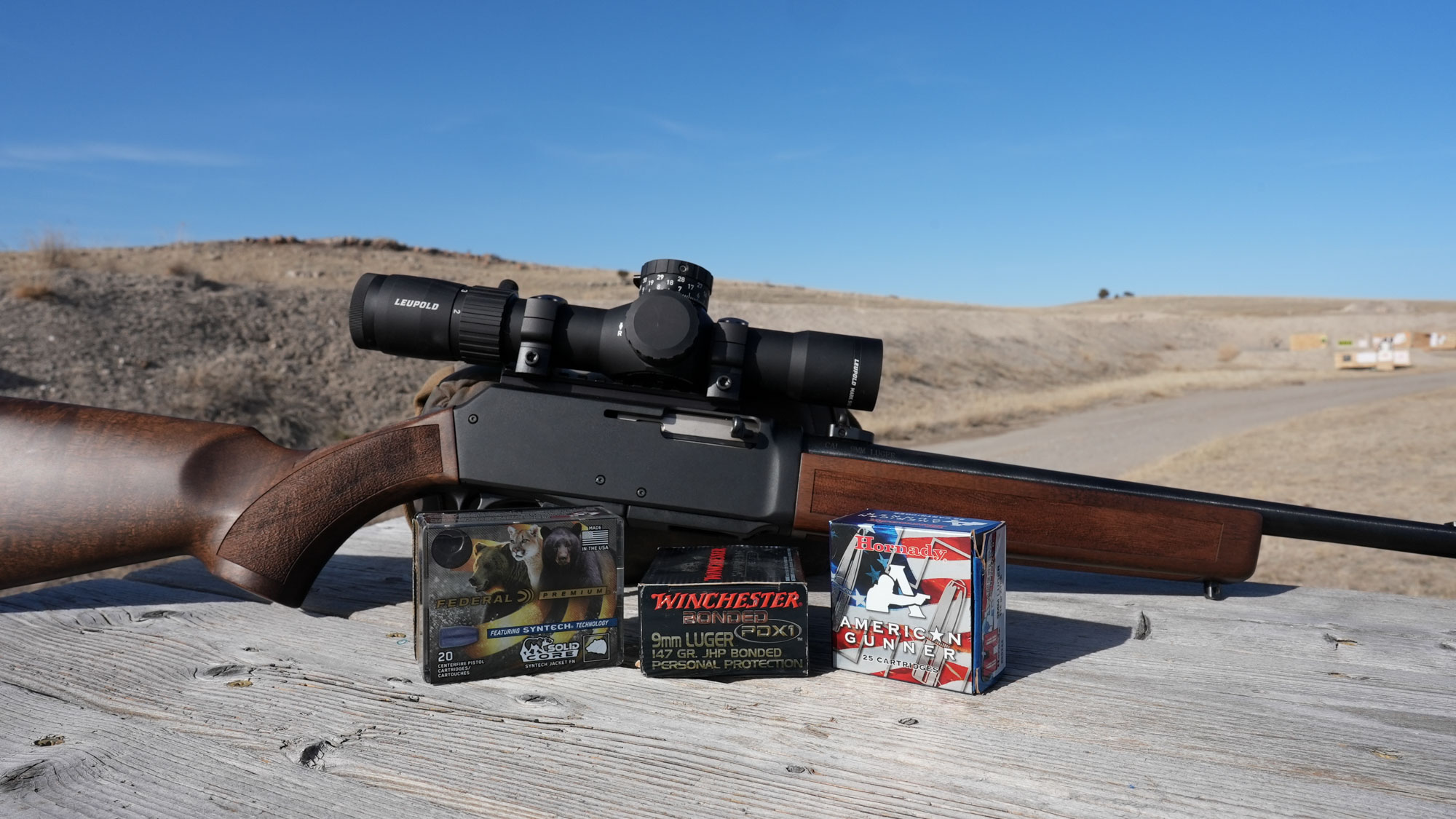
The brand new 2-10×30 Mark 5HD may slot in nearly any of our Out of doors Life optics take a look at classes, from our Low Energy Variable Optic group to our Greatest Whitetail Scopes. However its huge versatility makes it an excellent match for this crossover class, because it’s a helpful rimfire precision scope, a really succesful mid-range deer scope, and at dwelling on any AR carbine.
The scope’s DNA descends from the navy’s Designated Marksman Rifle, a 7.62×51 semi-auto carbine deployed by america Marine Corps as a medium-range sniper platform. Leupold’s model simply transitions to a carbine or short-action bolt rifle that is perhaps used from bear season to elk nation and spends its time between seasons as a truck gun. Testers famous that its sharp reticle and really tactile turrets make it an excellent rimfire scope.
Amongst its tasty attributes: glorious glass and really helpful hash-style TMR reticle (since our take a look at, Leupold has added an MOA model of the reticle and a TMR mannequin with illumination) that employs .5 MIL hashes, with .2 MIL graduations on the outer fringe of the reticle. Is that this scope going to win long-range metal challenges? Nope. Is it going to be one of the best match in your mountain elk rifle? In all probability not. However it might probably do both, together with an entire lot of extra work, which is the very definition of a flexible optic.
Learn Subsequent: Greatest LPVO Scopes
Greatest Second-Aircraft: Leupold VX-5HD 3-15×44 CDS-ZL2
Rating Card
- Optical Efficiency: Good
- Aiming System: Glorious
- Design: Glorious
- Worth/Worth: Very Good
Key Options
- 3-15-power magnification
- 30mm tube
- Second-plane MOA-based non-illuminated “Wind Plex” reticle
- 40-yards-to-infinity facet focus
- 75 MOA/22 MIL elevation adjustment vary
- Appropriate with Leupold’s Customized Dial System locking elevation turret
- 10-MOA windage holds on both facet of heart aiming level
Execs
- Coatings enhance low-light distinction
- Helpful 5:1 zoom ratio
- At about $1,100, an excellent worth
- Wind-Plex reticle helpful for fast photographs
Cons
- Reticle not likely configured for precision targets
- Reticle references require highest (15X) magnification
This is among the handful of “legacy” scopes we included on this yr’s optics take a look at with the intention to assess whether or not rifle scopes which have been available on the market for quite a lot of years are nonetheless as much as snuff with brand-new merchandise. Our group’s conclusion, largely primarily based on the satisfying efficiency of the venerable VX-5HD from Leupold, is a powerful sure.
The VX-5HD admittedly occupies a spot within the crossover scope pantheon that’s diminishing by the yr, a second-plane scope that has restricted utility for the form of long-range precision {that a} rising variety of shooters require of their searching optic. However we give Leupold an exaggerated head nod for constructing a scope that has sufficient long-range capturing abilities {that a} succesful goal shooter received’t really feel bare after they step to the road of a PRS competitors.
The glass on this scope is superb, and the finely calibrated facet focus snaps distant targets into focus. The reticle has nice distinction and determination to information photographs towards even cluttered backgrounds. And the CDS dial, when configured to a particular load, is exact sufficient to land photographs within the shut neighborhood of a goal properly past 1,000 yards.
However testers shortly acknowledged that that is primarily a searching scope. The straightforward reticle is configured for fast capturing, both in darkish timber or on the open plains. The windage references are usefully easy. And the ZL2 system, which permits for 2 revolutions of elevation adjustment, will stroll out photographs to the very finish of moral searching distances.
With the low-profile 44mm goal lens and 19.7-ounce heft, this can be a scope that’s at dwelling on a walk-about Western searching rifle. Not unhealthy for a scope line that was launched in 2017 and which remains to be the usual by which second-plane crossover scopes ought to be judged.
Greatest Glass: Blaser B2 2-12×50
Rating Card
- Optical Efficiency: Glorious
- Aiming System: Very Good
- Design: Very Good
- Worth/Worth: Good
Key Options
- 2-12-power magnification
- 30mm tube
- Second-plane 4C duplex reticle
- Infinitely adjustable center-dot illumination
- Capped turrets tuned to 1 cm @ 100 m values
- Particular ocular lens cap prompts illumination
Execs
- Greatest optical efficiency in our take a look at
- Velvety turret controls
- Modest magnification vary
- Optimized to be used with clip-on thermal unit
- Priced at about $1,900, accessible for a German rifle scope
Cons
- Turrets not configured for dialing
- Restricted holdover or holdoff reticle references
The second technology of Blaser’s rifle scope line, this iteration brings the form of high-end glass and coatings you’d count on from a German optics model. However not like the primary technology of Blaser scopes, which featured best-in-class gentle transmission and the form of super-subtle illumination required of high-seat shooters who hunt roe deer and stag at night time, the B2 makes an vital concession. The optics, whereas glorious, aren’t remarkably higher than different premium scopes. That’s as a result of a significant revolution has affected the standard German hunter: the arrival of thermal optics.
As a result of clip-on thermals have gotten so widespread throughout Europe, the necessity for hyper-powerful optical efficiency is diminishing as hunters merely clip on a thermal gadget to their conventional scopes as soon as the solar goes down. The Blaser B2 is one among this new technology of scopes which have shorter optical paths and general size with the intention to accommodate a clip-on thermal. It’s no accident that our pattern of the B2 shipped with a converter and pattern of Liemke’s new LUCHS-1 thermal clip-on. Blaser lately purchased Liemke with the intention to deliver its thermal capabilities into the home that features Sauer, Blaser, Mauser, and Rigby manufacturers in Europe, together with Sig Sauer within the U.S.
With that context in thoughts, the Blaser is a really succesful stand-alone rifle scope, with glorious low-light capabilities and velvety turret controls. However the 4C duplex reticle makes is an beginner on the long-range searching and capturing video games which can be redefining the crossover rifle scope. Nonetheless, in case you’re on the lookout for a German scope that retails for underneath $2,000 and can turn out to be an heirloom optic for whitetail hunters, it’s onerous to beat this new, old school, trendy scope.
Greatest Digital: Burris Veracity PH 4-20×50
Rating Card
- Optical Efficiency: Good
- Aiming System: Very Good
- Design: Good
- Worth/Worth: Very Good
Key Options
- 4-20-power magnification
- 30mm tube
- First-plane “Wind MOA” reticle
- Digital heads-up show reveals elevation turret, cant, angle, and distance-accurate wind holds
- Clickless programmable elevation knob
- Appropriate with BurrisConnect ballistic app
- Turrets tuned to .25 MOA click on values
- 50-yards-to-infinity parallax management
Execs
- Progressive hybrid of optical and digital capabilities
- Clickless elevation turret permits infinite adjustability
- Means to load bullet profiles aids precision functionality
- Helpful wind references
Cons
- Disappointing optical efficiency
- Exhausting to finely focus picture
The Veracity PH represents an vital evolution within the advance of electro-optics, or these glass-and-metal optics that incorporate built-in circuits and LED shows into their operation.
In contrast to Burris’s revolutionary Eliminator range-finding scope, the Veracity PH doesn’t comprise a laser rangefinder. Nevertheless it does have a digital elevation turret that communicates with its glorious first-plane MOA-based reticle. Use your rangefinder to find out the exact distance to your goal. Then dial the Programmable Elevation Knob (Burris calls this the PEK) till the gap within the heads-up show contained in the scope matches your goal distance. Then you should utilize any variety of aiming options, holding over in inches, yards, meters, or MOA. The show additionally has a cant indicator, rifle angle indicator, and distance-accurate wind holds.
Amongst its many ground-breaking attributes is that PEK, which mixes a digital sensor with a clickless mechanical elevation turret for accuracy right down to the 1/10 MOA. While you use Burris’s ballistic app with the digital turrets, you will get very exact holds out to a mile.
The Burris has respectable analog capabilities that enable customers to make use of all of the reticle references and turret controls to dial in a shot, even when the batteries conk out. However with the batteries in play, and with a succesful rangefinder to offer distance, the scope does double obligation as an excellent goal scope that may ring metal on a short-range rimfire or a PRS chassis rifle. However its actual abilities shine within the discipline, particularly at these center to longish distances, from about 400 to 800 yards, the place quite a lot of photographs at Western recreation happen, typically by shooters who haven’t adequately practiced with their rifle-and-scope combo at that vary.
With a real-world price ticket round $1,200, the Burris is an astounding worth for such a flexible optic, and one which capably represents the rising pattern of incorporating electronics in conventional capturing/searching optics.
Greatest Precision: Zeiss LRP S3 4-25×50
Rating Card
- Optical Efficiency: Glorious
- Aiming System: Very Good
- Design: Good
- Worth/Worth: Good
Key Options
- 4-26-power magnification
- 34mm tube
- Greatest-in-class elevation adjustment
- Daylight-visible reticle illumination
- Glorious zero cease
- 15-meters-to-infinity parallax focus
- 160 MOA/46.5 MIL inner adjustment
- First-plane reticle out there in both MOA or MIL increments
Execs
- Extraordinarily brilliant and clear glass
- Greatest turret dynamics of this class
- Configured for long-range precision goal work
- Greatest inner adjustment within the class
Cons
- Excessive turrets not ideally suited for searching conditions
- At 36.7 ounces, heavy for a searching optic
An heirloom optic that performs like an Olympic athlete within the discipline and on the vary, the Zeiss LRP S3 is a scaled-down model of the model’s large S5 precision scope. The smaller dimension and magnification vary makes an trustworthy case as a searching optic, however the actuality is that this has so many precision-shooting attributes that it’s first one of many greatest lengthy vary rifle scopes and solely a distant second a searching scope.
Constructed on a 34mm tube, the LRP S3 has a whopping 160 MOA (46.5 MRAD) of inner elevation adjustment, so shooters who wish to dial an aiming resolution can go from 200 yards out to a mile with out an elevated rail. On the opposite finish of the vary, the 15-meter parallax makes this a really succesful competitors rimfire scope.
The glass, brilliant and crisp, simply what you’d count on from a premium European model, and the controls flip with the precision of a scientific instrument. A strong zero cease, exterior locking windage turret, and glorious illumination full the bundle, which is offered in both MOA or MIL increments. The tree-style reticle of the MIL model is somewhat busy for a lot of searching conditions, however for precision shooters who wish to take their competitors reticle to the Western prairies and mountains, there’s no higher scope. The LRP S3 retails for round $2,000, which represents a relative discount for a lot optical horsepower and precision-shooting engineering.
Greatest for Western Large-Sport: Tract Toric UltraHD 2.5-15×44
Rating Card
- Optical Efficiency: Very Good
- Aiming System: Very Good
- Design: Very Good
- Worth/Worth: Good
Key Options
- 2.5-15-power magnification
- 30mm tube
- First-plane, hash-style reticle
- Pull-to-turn tall elevation turret tuned to .25 MOA/.1 MIL click on values
- Capped windage turret
- Zero cease
Execs
- Extraordinarily brilliant and clear glass
- Very responsive controls
- Versatile reticle
- Facet parallax from 10 yards to infinity
- Non-obligatory illumination (additional $70)
- Priced underneath $1,000 ($924)
Cons
- At highest magnification, reticle can obscure goal
- At lowest magnification, non-illuminated reticle not seen
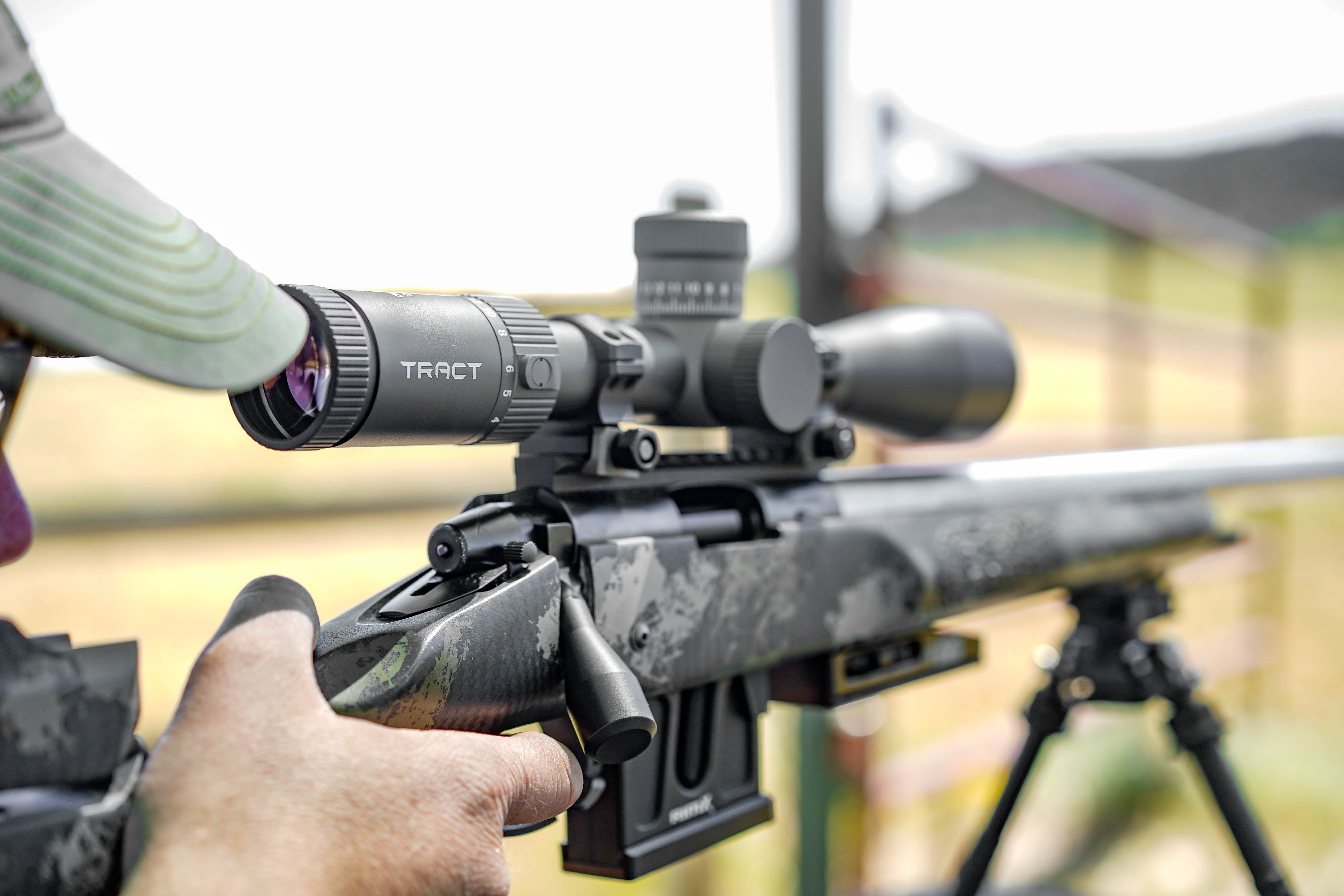
This versatile optic from a rising star of the direct-to-consumer model could be very near the Platonic ideally suited for a crossover rifle scope. Whereas it has attributes that suggest it for a goal scope, it’s actually at dwelling on the wide-open recreation lands of the American West.
Options that qualify it for consideration as a goal scope embrace a flexible hash-style reticle with ample holdover references on the vertical stadia and comparable windage holds on the horizontal crosshair. The milliradian-based reticle has .5 MRAD marks alternating with full-value 1 MRAD hashes. The primary-plane reticle has .25 MRAD grids on the higher vertical and decrease horizontal posts for exact goal measurement and ranging. The MOA model of the reticle is damaged into 1 MOA increments between 5 MOA marks with .5 MOA marks on the ends of the vertical and horizontal traces.
The ten-yards-to-infinity facet focus makes this a wonderful rimfire goal scope, and like the opposite controls on the Tract, the dial strikes with exact authority.
Elevate-to-turn elevation turrets are tall — a bit too tall, our testers concluded — and transfer as if gliding on ball bearings. The windage turret is capped. The MOA model, as you’d count on, is tuned to .25 MOA click on values, whereas the MRAD model has .1 MIL steps. The Tract ships with a wonderful multi-rotational zero cease, however customers should set up this themselves.
Attributes that lend the Toric UltraHD to searching are its low profile and 30mm tube, which comprises 100 MOA (30 MRAD) elevation adjustment, and its comparatively gentle 28-ounce weight. The hash-style reticle is infinitely versatile, whether or not dialed right down to decrease magnifications for fast photographs or dialed up for extra deliberate holdover and holdoff bullet placement. Our pattern was unilluminated, however for one more $70, the Toric UltraHD has heart aiming cross illumination with 11 depth steps. The daylight-bright illumination is a pleasant characteristic for low-power aiming.
With a matte graphite end, the Tract is a trendy, responsive, and pretty priced bundle that can assist flip in good mid-range metal scores, however is constructed for the sphere.
Greatest Light-weight: Vortex Razor HD LHT 4.5-22×50
Rating Card
- Optical Efficiency: Good
- Aiming System: Very Good
- Design: Very Good
- Worth/Worth: Good
Key Options
- 4.5-22-power magnification
- 30mm tube
- First-plane tree-style reticle
- Pull-to-turn tall elevation turret tuned to .25 MOA/.1 MIL click on values
- Capped windage turret
- Zero cease
- 21.7 ounces
Execs
- Extraordinarily brilliant and clear glass
- Sized-down model of Vortex’s premium goal scope
- Versatile XLR-2 MOA or MRAD first-plane reticle
- Facet parallax from 25 yards to infinity
- Free ballistic turret strip included with buy
Cons
- Reticle could also be too busy for some searching conditions
- 22.4 MRAD/75 MOA elevation adjustment lower than friends

This can be one of the best instance of a real goal/searching scope in our take a look at. Vortex has taken the premium optics and exact reticle of its top-of-the-line goal scope — the Razor HD Gen II—and brought away heft and bulk to suit nearly any searching rifle or discipline state of affairs.
The very title — Mild Hunter Tactical — will get at its versatility. How Vortex manages to pack so many options right into a scope that weighs underneath 1.5 kilos is a thriller, but it surely has glorious illumination, a 25-yard-to-infinity parallax focus, locking elevation turret, one of the best zero cease within the enterprise, and a magnification vary that can focus shut for rimfire competitions and manner on the market for long-range metal and far-distant mule deer and pronghorns the place holding for wind is the distinction between a strong hit and a miss or a wounded animal. We’d wish to see a bit extra elevation vary contained in the 30mm tube for these shooters who wish to dial aiming options for way-out targets.
The Vortex scored properly on its aiming-system evaluation. Testers appreciated the precision of the tree-style reticle, despite the fact that some pure hunters complained that it’s too busy and tough to make use of for fast photographs. They usually typically appreciated the construct, with responsive turrets and tack-sharp focus. They had been much less charitable with the optics. The Vortex scored in the course of the sphere for each low-light and optical decision, and testers complained about some vignetting in sunny circumstances.
Testers additionally thought that, at $1,999 MSRP and about $1,380 real-world pricing, that the Razor LHT was a bit overpriced contemplating its peer group. However few different scopes provide this quantity of precision searching and goal options in such a light-weight and nimble bundle.
Learn our full Razor HD LHT assessment to study extra
Greatest Redesigned: Riton 5 Primal 2-12×44
Rating Card
- Optical Efficiency: Good
- Aiming System: Good
- Design: Good
- Worth/Worth: Very Good
Key Options
- 2-12-power magnification
- 30mm tube
- Second-plane hash-style PHD reticle
- Capped, zero-resettable turrets tuned to .25 MOA click on values
- 90 MOA complete elevation adjustment vary
- Three-height throw lever
Execs
- Redesigned and strengthened erector system
- Airgun rated
- 10-yards-to-infinity parallax focus
- Open heart aiming level
- Very helpful magnification vary
Cons
- Second-plane reticle configured extra for searching than goal work
- Reticle references work on 12-power
That is one among a giant group of Riton rifle scopes that has been redesigned, with higher glass and a way more strong erector system (that’s the spring-tension system that’s activated by the turrets, with the intention to transfer the reticle up, down, left, or proper in relation to your goal) than the originals.
Contemplate this a hunting-first optic. The second-plane reticle is straightforward, intuitive, and quick on targets. That’s vital, as a result of the capped reticles are onerous to deploy to dial an aiming resolution within the discipline. The hash-style reticle has alternating lengths to make holdover and holdoff work easy and quick. The middle illuminated aiming dot is quick and easy.
We had been somewhat dissatisfied within the glass; the 5 Primal completed in the course of the sphere in each low-light and determination, however testers cherished the three-height throw lever that may go from low profile to toweringly excessive to assist fast magnification changes. Add a fantastic 10-yards-to-infinity facet focus, rezeroable turrets, and strong flip-up lens covers, and this can be a fairly whole lot in a strong searching scope with respectable goal chops.
Greatest Entry-Degree: Sightmark Presidio 3-18×50
Rating Card
- Optical Efficiency: Honest
- Aiming System: Good
- Design: Good
- Worth/Worth: Very Good
Key Options
- 3-18-power magnification
- 30mm tube
- First-plane tree-style reticle
- Uncovered turrets tuned to .1 MIL click on values
- Capped windage turret
Execs
- 10-yards-to-infinity facet parallax management
- At underneath $400, very accessible
- Facet parallax from 10 yards to infinity
- Pink reticle illumination
- Throw lever included
- Helpful rimfire competitors attributes
Cons
- Squinty glass
- Complicated turret indexing
In case you’re on the lookout for a discount in a flexible rifle scope, give this full-featured Sightmark a glance. It’s a good selection for a shooter who’s starting to dabble in long-range capturing, or who’s breaking into precision rimfire video games. Whereas its searching chops are respectable, take into account this primarily a goal scope that may double as an excellent mid-range searching optic.
The center of the Sightmark is its succesful LR2 tree-style reticle within the first focal aircraft. Six illumination intensities blaze from daylight brilliant to a reasonably dim burn. The uncovered elevation and windage turrets have a 25 MIL adjustment vary, which makes this a reasonably good scope to both maintain or dial.
Testers weren’t impressed with the glass. The Sightmark scored on the backside of our low-light take a look at and simply above backside in optical decision. However the 3-18X magnification vary is extraordinarily helpful, and the reticle and 10-yards-and-up focus make this a worthy goal scope from silhouette rimfire work to mid-to-long-range metal competitions. And at underneath $400, it’s a raging discount.
Find out how to Select a Versatile Searching Scope

First, spend a while and analysis in your main use for a crossover searching/goal scope. Do you primarily intend to make use of it to ring metal, or to hunt animals? If the previous, then you definitely’re most likely going to need a scope with a first-plane reticle and tactical-style turrets, amongst different attributes, which could embrace reticle illumination and facet parallax focus. If the latter, then you definitely would possibly lean towards a easy reticle, both a hash-style within the first focal aircraft or a bullet-drop-compensating reticle within the second aircraft. Bear in mind, although, that the majority second-plane reticle references work solely on the very best magnification, so that you’ll wish to make certain your potential scope isn’t overly magnified.
For goal shooters, take into account whether or not you’re a turret dialer or a reticle holder. These are the 2 predominant strategies of putting a bullet on a distant goal, no matter whether or not it’s metal or hair. Dialers usually need uncovered turrets which have clear indexing and really responsive clicks, together with a zero cease and a easy return-to-zero functionality. Holders typically need granular reticle references to allow them to maintain over for elevation and maintain off one facet or the opposite of the goal to compensate for wind drift. They typically need first-plane reticles, which supply the identical values, or subtensions, no matter magnification.
Hunters add a pair extra concerns to this equation. They typically need capped turrets, or no less than locking turrets, in order that they received’t inadvertently transfer within the discipline. They usually typically need easy reticle structure, to allow them to make fast photographs in dynamic conditions.
As you take into account candidates for a crossover scope, have a look at attributes comparable to reticle illumination, parallax focus, and add-ons like magnification throw levers, customizable turrets, and interface with a ballistic app. Lastly, take into account a scope’s guarantee as you assess its value/worth. That is an evaluation of how a lot bang you get in your buck, and within the case of those versatile scopes, the extra forms of capturing you are able to do competently with an optic, the upper that worth evaluation will likely be.
Remaining Ideas on the Greatest Searching Scopes
This is among the most subjective classes in our optics take a look at, as a result of every scope occupies the squishy center floor between an all-around searching optic and the very prescriptive design of a precision scope. Whether or not a single entry is healthier for elk searching or long-range metal ringing is admittedly arbitrary. So take into account a few of these “Greatest For…” descriptions as our manner to assist categorize submissions on one facet or the opposite of the Searching vs Taking pictures divide.
If the flexibility of those scopes make them onerous to categorize, the wide-ranging utility of them makes these among the many greatest bargains in optics. A single scope that may do triple obligation as a close-range rimfire plinker, a long-range goal scope, after which show you how to bag an elk or mule deer is value its weight, not just for its main use, however for its secondary functions, as properly.
[ad_2]


